- Election 2024
- Entertainment
- Newsletters
- Photography
- Personal Finance
- AP Investigations
- AP Buyline Personal Finance
- AP Buyline Shopping
- Press Releases
- Israel-Hamas War
- Russia-Ukraine War
- Global elections
- Asia Pacific
- Latin America
- Middle East
- Election Results
- Delegate Tracker
- AP & Elections
- Auto Racing
- 2024 Paris Olympic Games
- Movie reviews
- Book reviews
- Personal finance
- Financial Markets
- Business Highlights
- Financial wellness
- Artificial Intelligence
- Social Media

Venezuelans are increasingly stuck in Mexico, explaining drop in illegal crossings to US
A migrant from Maracaibo, Venezuela, sits on a railroad track lined by makeshift tents where migrants take refuge in Mexico City, Tuesday, March 26, 2024. (AP Photo/Fernando Llano)
A migrant family from Venezuela eats breakfast alongside the railroad tracks in Mexico City, Tuesday, March 26, 2024. (AP Photo/Fernando Llano)
Migrants from Venezuela cut hair alongside railroad tracks lined with makeshift tents used by migrants traveling north, in Mexico City, Tuesday, March 26, 2024. (AP Photo/Fernando Llano)
A migrant family from Venezuela has breakfast alongside the railroad tracks lined with makeshift tents in Mexico City, Tuesday, March 26, 2024. (AP Photo/Fernando Llano)
A young migrant from Venezuela plays with a spinning top on the railroad tracks lined by tents and makeshift shelters in Mexico City, Tuesday, March 26, 2024. (AP Photo/Fernando Llano)
- Copy Link copied
MEXICO CITY (AP) — Venezuelan migrants often have a quick answer when asked to name the most difficult stretch of their eight-country journey to the U.S. border, and it’s not the dayslong jungle trek through Colombia and Panama with its venomous vipers, giant spiders and scorpions. It’s Mexico.
“In the jungle, you have to prepare for animals. In Mexico, you have to prepare for humans,” Daniel Ventura, 37, said after three days walking through the Darien Gap and four months waiting in Mexico to enter the U.S. legally using the government’s online appointment system, called CBP One . He and his family of six were headed to Fort Atkinson, Wisconsin, where he has a relative.
Mexico’s crackdown on immigration in recent months — at the urging of the Biden administration — has hit Venezuelans especially hard. The development highlights how much the U.S. depends on Mexico to control migration, which has reached unprecedented levels and is a top issue for voters as President Joe Biden seeks reelection.
Arrests of migrants for illegally crossing the U.S.-Mexico border have dropped so this year after a record high in December. The biggest decline was among Venezuelans, whose arrests plummeted to 3,184 in February and 4,422 in January from 49,717 in December.
While two months do not make a trend and illegal crossings remain high by historical standards, Mexico’s strategy to keep migrants closer to its border with Guatemala than the U.S. is at least temporary relief for the Biden administration.
Large numbers of Venezuelans began reaching the U.S. in 2021, first by flying to Mexico and then on foot and by bus after Mexico imposed visa restrictions. In September, Venezuelans briefly replaced Mexicans as the largest nationality crossing the border.
Mexico’s efforts have included forcing migrants from trains, flying and busing them to the southern part of the country, and flying some home to Venezuela .
AP AUDIO: Venezuelans are increasingly stuck in Mexico, explaining drop in illegal crossings to US.
AP reporter Karen Chammas has more.
Last week, Mexico said it would give about $110 a month for six months to each Venezuelan it deports, hoping they won’t come back. Mexican President Andres Manuel López Obrador extended the offer Tuesday to Ecuadorians and Colombians.
“If you support people in their places of origin, the migratory flow reduces considerably, but that requires resources and that is what the United States government has not wanted to do,” said López Obrador, who is barred by term limits from running in June elections.
Migrants say they must pay corrupt officials at Mexico’s frequent government checkpoints to avoid being sent back to southern cities. Each setback is costly and frustrating.
“In the end, it is a business because wherever you get to, they want to take the last of what you have,” said Yessica Gutierrez, 30, who left Venezuela in January in a group of 15 family members that includes young children. They avoided some checkpoints by hiking through brush.
The group is now waiting in Mexico City to get an appointment so they can legally cross the U.S.-Mexico border. To use the CBP One app, applicants must be in central or northern Mexico. So Gutierrez’s group sleeps in two donated tents across the street from a migrant shelter and check the app daily.
More than 500,000 migrants have used the app to enter the U.S. at land crossings with Mexico since its introduction in January 2023. They can stay in the U.S. for two years under a presidential authority called parole , which entitles them to work.
“I would rather cross the jungle 10 times than pass through Mexico once,” said Jose Alberto Uzcategui, who left a construction job in the Venezuelan city of Trujillo with his wife and sons, ages 5 and 7, in a family group of 11. They are biding time in Mexico City until they have enough money for a phone so they can use CBP One.
Venezuelans account for the vast majority of 73,166 migrants who crossed the Darien Gap in January and February, which is on pace to pass last year’s record of more than 500,000, according to the Panamanian government, suggesting Venezuelans are still fleeing a country that has lost more than 7 million people amid political turmoil and economic decline. Mexican authorities stopped Venezuelan migrants more than 56,000 times in February, about twice as much as the previous two months, according to government figures.
“The underlying question here is: Where are the Venezuelans? They’re in Mexico, but where are they?” said Stephanie Brewer, who covers Mexico for the Washington Office on Latin America, a group that monitors human rights abuses.
Mexico deported only about 429 Venezuelans during the first two months of 2024, meaning nearly all are waiting in Mexico.
Many fear that venturing north of Mexico City will get them fleeced or returned to southern Mexico. The U.S. admits 1,450 people a day through CBP One with appointments that are granted two weeks out.
Even if they evade Mexican authorities, migrants feel threatened by gangs who kidnap, extort and commit other violent crimes.
“You have to go town by town because the cartels need to put food on their plates,” said Maria Victoria Colmenares, 27, who waited seven months in Mexico City for a CBP One appointment, supporting her family by working as a waitress while her husband worked at a car wash.
“It’s worth the wait because it brings a reward,” said Colmenares, who took a taxi from the Tijuana airport to the border crossing with San Diego, hours before her Tuesday appointment.
Texas Republican Gov. Greg Abbott has touted his own efforts to explain the recent reduction in illegal crossings in his state, where at least 95% of Border Patrol arrests of Venezuelans occur. Those have included installing razor wire , putting a floating barrier in the Rio Grande and making plans to build a new base for members of the National Guard.
U.S. Homeland Security Secretary Alejandro Mayorkas has mostly credited Mexico for the drop in border arrests.
Some Venezuelans still come north despite the perils.
Marbelis Torrealba, 35, arrived in Matamoros, across the border from Brownsville, Texas, with her sister and niece this week, carrying ashes of her daughter who drowned in a boat that capsized in Nicaragua. She said they were robbed by Mexican officials and gangs and returned several times to southern Mexico.
A shelter arranged for them to enter the U.S. legally on emergency humanitarian grounds, but she was prepared to cross illegally.
“I already experienced the worst: Seeing your child die in front of you and not being able to do anything.”
Spagat reported from Tijuana, Mexico, and Gonzalez reported from Matamoros. Associated Press reporter Rebecca Santana in Washington, D.C., also contributed.

- Littler GPS
- Workplace Policy Institute
- Littler CaseSmart
- Littler Home Care Toolkit
- Littler LaborSmart
- ComplianceHR
- Littler X-celerator Toolkits
- Littler Knowledge Management
- General Data Protection Regulation (GDPR)
- Littler Edge
- Littler Pay Equity Assessment
- Workplace Training
- Littler onDemand
- Remote Work Toolkit for Employers
- Self-Service Toolkits
- Recognized for Innovation
- We’re ready for your tomorrow – because we’re built for it.
- Littler Investigation Toolkit for Employers
- Littler Inclusion, Equity and Diversity Playbook

Venezuelans Will Need a Visa to Enter Mexico as of January 21, 2022
On January 6, 2022, the Mexican Ministry of the Interior published in the Official Gazette of the Federation an agreement announcing a change in Mexican migration policy, requiring Venezuelan citizens to obtain a visa to enter national territory. This change will take effect on January 21, 2022, and will require all Venezuelan citizens wanting to enter Mexico to first obtain an ordinary visa from a Mexican consular representation abroad.
One of the main reasons for issuing this provision was because from January to September 2021, there was a substantial increase in the number of Venezuelans entering Mexico for a purpose other than those allowed, such as irregular transit to a third country, representing an increase of more than one thousand percent compared to the same period in the previous five years.
It is important to keep in mind that, as with other nationalities that require a visa, Venezuelan citizens may be exempt from applying for a Mexican visa if they prove any of the following conditions:
- The individual is a permanent resident of Canada, the United States of America, Japan, the United Kingdom of Great Britain and Northern Ireland, any of the countries that make up the Schengen Area of Europe, or of a member country of the Pacific Alliance (Chile, Colombia, and Peru); or
- Holds a valid visa from Canada, the United States of America, Japan, the United Kingdom of Great Britain and Northern Ireland, or any of the countries that make up the Schengen Area.
The Ministry of the Interior, together with the Ministry of Foreign Affairs, will carry out the necessary actions to update the procedures, systems, and information bases on the entry of Venezuelan nationals into the country. It is therefore important for employers to adjust the travel itineraries of their employees, taking into consideration the day this provision will take effect.
Our attorneys are available for consultation on this development or any employment-related topic.
Information contained in this publication is intended for informational purposes only and does not constitute legal advice or opinion, nor is it a substitute for the professional judgment of an attorney.
Get the Latest From Littler
Subscribe RSS Updates

Rogelio Alanis Robles

Alondra Valdez Padilla
Focus areas, related news & analysis.
Visa rules in Mexico don’t stop Venezuelans headed to U.S.
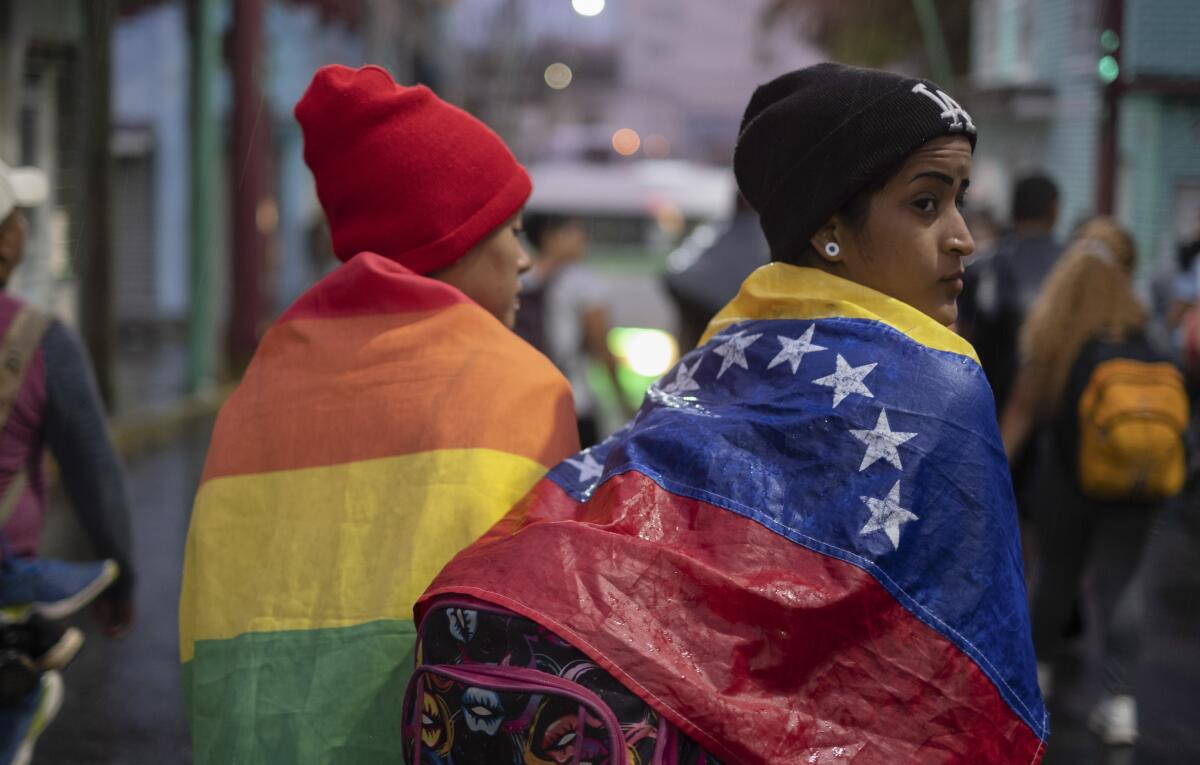
- Show more sharing options
- Copy Link URL Copied!
When Mexico imposed a visa requirement on Venezuelans in January, it briefly had the desired effect: The number of Venezuelans detained at the U.S.-Mexico border plunged. But it’s now clear that it only pushed the migrants onto more dangerous clandestine routes.
Suddenly unable to simply fly to Mexico as tourists, but still desperate to leave their country, Venezuelan migrants joined others traveling overland through the dense, lawless jungle on the Colombia-Panama border.
In 2021, when Venezuelans could still fly to Cancun or Mexico City as tourists, only 3,000 of them crossed the Darien Gap — a break in the Pan-American Highway that stretches along 60 miles of mountains, rainforest and rivers. So far this year, there have been 45,000, according to Panama’s National Immigration Service.
“If they can’t arrive at Mexican airports, they’re arriving by land through the Darien,” said Adam Isacson of the think tank Washington Office on Latin America, or WOLA. From there it’s just a series of stops: in southern Mexico, the remote middle of the Mexico-U.S. border and then a final destination in the U.S., usually on the East Coast.
Such visa requirements can stop some migrants — the pace of Brazilians and Ecuadoreans slowed after Mexico imposed the measures last year — but not others, Isacson said. “It has to do with the level of desperation,” he said.
Venezuela’s economy has collapsed under a combination of mismanagement and U.S. sanctions. The minimum wage for public employees has fallen to the equivalent of $2 a month. Monthly salaries in the private sector average $75. Some of the Venezuelans arriving in the U.S. now left Venezuela years ago, spent time in other countries and are moving north now.
In December, U.S. Customs and Border Protection detained Venezuelans at the U.S.-Mexico border nearly 25,000 times. Mexico imposed the visa requirement in late January, and in February there were barely 3,000 detentions. But that number began to rise again, slowly at first, and then sharply in June and July, during which detentions surpassed 17,000.
The information about the alternative route was shared by groups on platforms such as WhatsApp and on social media. Migrant smugglers who often infiltrate such groups wield influence over the route they take, in this case a treacherous, yet well-established one, some 5,000 miles long.
Construction worker Anderwis Gutiérrez, 42, and his wife spent weeks watching videos about crossing the Darien to judge whether they could do it. When they finally made up their minds, they joined a group of 110 migrants of various nationalities. Only 75 emerged from the jungle together.
“They robbed us, took our money; we lasted four days without eating,” he said. “One broke his leg, another was bitten by a snake; we didn’t have medicine, we weren’t carrying anything.”
He said they saw bodies, witnessed two rapes and, unable to hold back his tears, said that his wife almost drowned when a swollen river carried her 100 yards downstream. “In the jungle no one helps anybody.”
Yonathan Ávila, a 34-year-old former Venezuelan national guard soldier, traveled with his wife, their 3-year-old daughter and 4-month-old baby. Their group consisted of 14 relatives and friends. He believes his military training helped him lead them safely through the route.
The southern Mexican city of Tapachula near the border with Guatemala has been the second bottleneck for those traveling by land. Since the Trump administration, Mexico has employed a strategy of containment meant to keep migrants confined to the south, far from the U.S. border.
Thousands apply for asylum, but the process is lengthy and there is little work in Tapachula. Frustrated migrants have pressured the government by repeatedly walking out of the city en masse. Since June, Venezuelans have made up the majority.
The Mexican government started busing migrants to offices outside Tapachula or to other states in October for quicker processing of temporary documents and to stop the demonstrations.
Ávila led one such march and got a transit permit that allowed his family to continue north. A foundation also helped because his baby was sick. Gutiérrez received a humanitarian visa.
“To appease them, the National Immigration Institute is giving them passes,” Isacson said.
Venezuelans and some other nationalities also pose a problem for Mexico and the United States, because they generally can’t be deported. After much negotiation, Mexico was recently able to send back more than 100 migrants.
Once out of Tapachula, the migrants travel quickly to the U.S. border, usually buying bus tickets with money sent by relatives.
According to WOLA’s analysis of U.S. Customs and Border Protection, 92% of the Venezuelans crossed the U.S. border at two stretches in July: Yuma, Ariz., and Del Rio, Texas.
Gutiérrez and Ávila crossed at Del Rio with their families.
Both areas are “in the middle of nowhere,” Isacson said. “That tells us that they are being guided there by someone.”
Gutiérrez and Ávila made it to the U.S. with their families. Gutiérrez was in Maryland, but without work or a place to sleep, he and his wife were planning to return to New York, where they had spent a couple of months in a homeless shelter.
Ávila has a sales job in Boston and a charitable foundation has found his family shelter and helped get treatment for his kid. Each week he has to send a photograph and his location on a cellphone provided by U.S. immigration authorities while he waits to sort out his status.
Meanwhile, he says his friends in Venezuela haven’t stopped asking him for advice about their own journeys to the U.S. “More are coming all the time.”
AP writers Claudia Torrens in New York and Juan Zamorano in Panama City contributed to this report.
More to Read
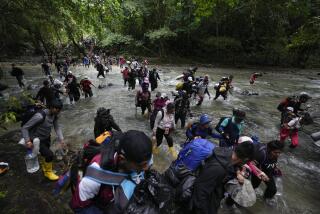
Panama’s next president says he’ll try to shut down one of the world’s busiest migration routes
May 12, 2024

This gentrifying Mexico City neighborhood has a Soho House — and a migrant encampment
May 7, 2024

Venezuela closes its embassy in Ecuador to protest raid on Mexico’s embassy there
April 16, 2024
World & Nation
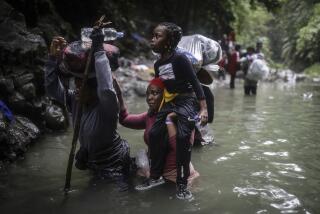
Panama and Colombia fail to protect migrants on Darien jungle route, Human Rights Watch says
April 3, 2024

Judge dismisses states’ challenge to Biden program allowing entry to migrants from 4 countries
March 8, 2024
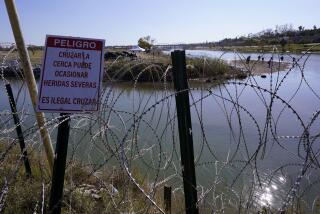
U.S. sees a drop in illegal border crossings after Mexico increases enforcement
Jan. 7, 2024
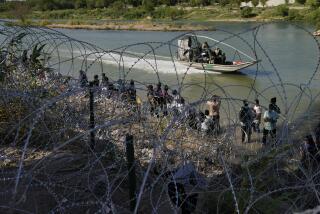
Illegal border crossings into U.S. drop in October after 3 months of increases
Nov. 14, 2023
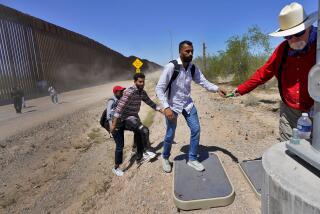
El Salvador slaps a $1,130 fee on African and Indian travelers to curb migration
Nov. 13, 2023
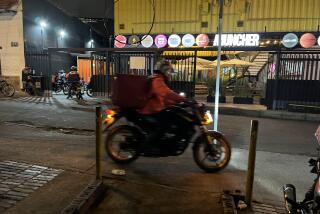
Latino Life
Venezuelan immigrants are ostracized in Colombia amid xenophobia and shifting politics
Oct. 27, 2023
Start your day right
Sign up for Essential California for news, features and recommendations from the L.A. Times and beyond in your inbox six days a week.
You may occasionally receive promotional content from the Los Angeles Times.
More From the Los Angeles Times
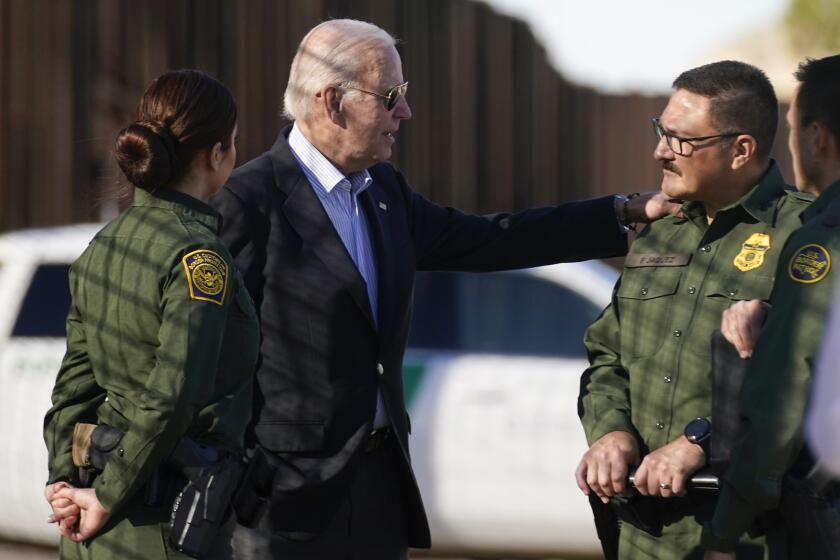
Opinion: Why Biden’s new border plan is a terrible idea
June 6, 2024

President Milei’s surprising devotion to Judaism and Israel provokes tension in Argentina, beyond
June 4, 2024
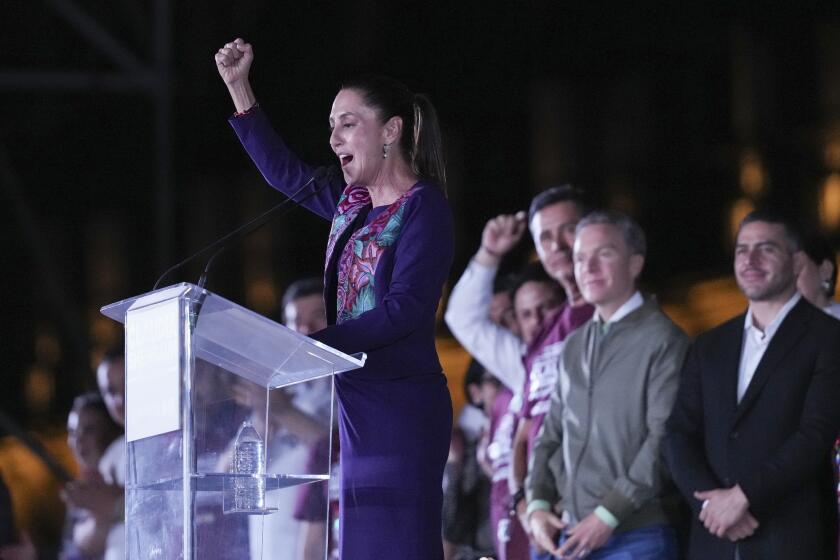
Opinion: Mexico’s election of Claudia Sheinbaum is historic. But should we be celebrating it?
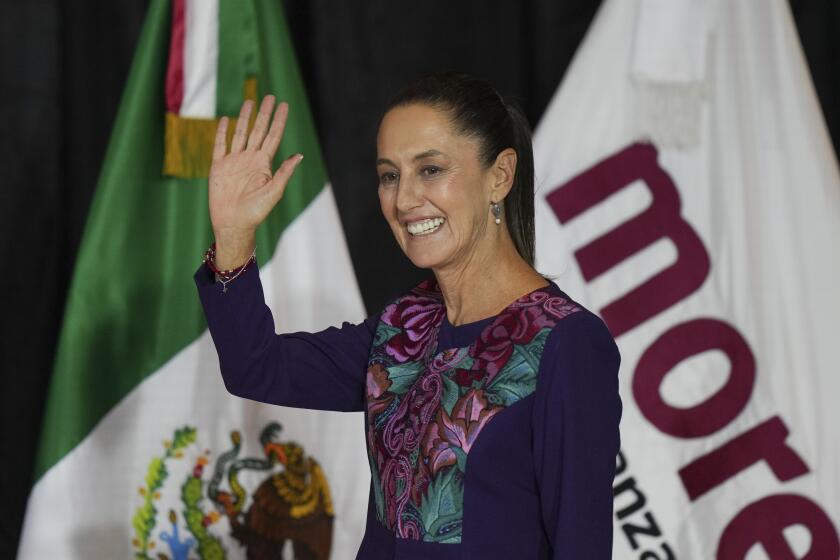
Column: What Mexico’s historic presidential election can teach the U.S.
We’re sorry, this site is currently experiencing technical difficulties. Please try again in a few moments. Exception: request blocked
Security Alert May 17, 2024
Worldwide caution, update may 10, 2024, information for u.s. citizens in the middle east.
- Travel Advisories |
- Contact Us |
- MyTravelGov |
Find U.S. Embassies & Consulates
Travel.state.gov, congressional liaison, special issuance agency, u.s. passports, international travel, intercountry adoption, international parental child abduction, records and authentications, popular links, travel advisories, mytravelgov, stay connected, legal resources, legal information, info for u.s. law enforcement, replace or certify documents.
Before You Go
Learn About Your Destination
While Abroad
Emergencies
Share this page:
Travel Advisory May 13, 2024
Venezuela - level 4: do not travel.
Reissued after routine periodic review with minor edits pursuant to Department of State standard processes.
Do not travel to Venezuela due to crime , civil unrest, kidnapping , and the arbitrary enforcement of local laws . Reconsider travel due to wrongful detentions , terrorism , and poor health infrastructure .
Country Summary: In March 2019, the U.S. Department of State withdrew all diplomatic personnel from U.S. Embassy Caracas and suspended operations. All consular services, routine and emergency, remain suspended until further notice. The U.S. government has no ability to provide emergency services to U.S. citizens in Venezuela. U.S. citizens in Venezuela who require consular assistance should try to leave the country as soon as safely possible to do so and should contact a U.S. embassy or consulate in another country.
Violent crimes, such as homicide, armed robbery, kidnapping, and carjacking, are common in Venezuela. Political rallies and demonstrations occur, often with little notice. Anti-Maduro demonstrations have elicited a strong police and security force response, including the use of tear gas, pepper spray, and rubber bullets against participants, and occasionally devolve into looting and vandalism. Shortages of gasoline, electricity, water, medicine, and medical supplies continue throughout much of Venezuela.
The Department has determined there is a high risk of wrongful detention of U.S. nationals in Venezuela. Security forces have detained U.S. citizens for up to five years. The U.S. government is not generally notified of the detention of U.S. citizens in Venezuela or granted access to U.S. citizen prisoners there.
Colombian terrorist groups operate in Venezuela’s border areas with Colombia, Brazil, and Guyana.
Read the country information page for additional information on travel to Venezuela.
If you decide to travel to Venezuela:
- Avoid all land border crossings into Venezuela on the Colombian border.
- Ensure you have a valid Venezuelan visa. Visas are not available upon arrival.
- Be prepared for the high risk of indefinite detention without consular access.
- Draft a will and designate appropriate insurance beneficiaries and/or power of attorney.
- Develop a communication plan with family and/or your employer or host organization. Establish a “proof of life” protocol with your loved ones, so that if you are taken hostage, your loved ones know specific questions (and answers) to ask the hostage-takers to be sure that you are alive (and to rule out a hoax).
- Have a contingency plan in place that does not rely on U.S. government assistance.
- Keep travel documents up to date and easily accessible.
- Avoid travel between cities, or between Simón Bolívar International Airport and Caracas at night.
- Do not take unregulated taxis from the Maiquetia “Simón Bolívar” International Airport and avoid ATMs in this area.
- Consider hiring a professional security organization.
- Bring a sufficient supply of over the counter and prescription medicines for the duration of travel.
- Consider purchasing medical evacuation insurance.
- Visit our website for Travel to High-Risk Areas .
- Enroll in the Smart Traveler Enrollment Program (STEP) to receive Alerts and make it easier to locate you in an emergency.
- Follow the Department of State on Facebook and Twitter .
- Review the Country Security Report for Venezuela.
- Visit the CDC page for the latest Travel Health Information related to your travel.
- Review the Traveler’s Checklist .
Embassy Messages
View Alerts and Messages Archive
Quick Facts
Two pages, for visa and entry stamp.
Yes. You must get a Venezuelan visa before traveling to Venezuela. Visas are not available upon arrival. Note: U.S. travelers risk lengthy or indefinite detention for attempts to arrive at any Venezuelan border crossing without a valid Venezuelan visa.
Yellow fever vaccination required if coming from or transiting for more than 12 hours through Brazil.
USD 10,000 (or equivalent) or more must be declared.
Embassies and Consulates
U.S. Embassy Colombia Calle 24 Bis No. 48-50 Bogotá, D.C. Colombia Telephone: +(57)(1) 275-2000 Emergency: +(57)(1) 275-2000 Fax: No fax Email: [email protected] Website
The U.S. Department of State strongly recommends that U.S. citizens do not travel to Venezuela, and that U.S. citizens remaining in Venezuela depart immediately. More information can be found in the U.S. Department of State’s Venezuela Travel Advisory .
The U.S. Embassy in Caracas suspended operations on March 11, 2019, and therefore cannot provide protection or consular services to U.S. citizens in Venezuela. The U.S. Embassy in Colombia assists U.S. citizens in Venezuela when possible.
If you are a U.S. citizen in Venezuela in need of assistance, or are concerned about a U.S. citizen in Venezuela, please contact us in one of the following ways:
Email [email protected] ; or
Call us at +1-888-407-4747 (from the U.S. & Canada) or +1-202-501-4444 (from overseas).
Destination Description
Learn about the U.S. relationship to countries around the world.
Entry, Exit and Visa Requirements
The U.S. Department of State strongly recommends U.S. citizens do not travel to Venezuela. If you must travel to Venezuela, we recommend you avoid all land border crossings into Venezuela on the Colombian border. Detentions of U.S. citizens at formal or informal border crossings into Venezuela are common.
To enter Venezuela, you must have:
- A valid U.S. passport in good condition with at least six months of validity, and
- A valid Venezuelan visa. Visas are not available upon arrival.
Visas: The Venezuelan embassy and consulates in the United States are not open for visa processing. Contact the Venezuelan Embassy in Washington at 202-342-2214 for updates about the future availability of visa services. You must have the proper visa class and appropriate accreditation before traveling to Venezuela or face refusal of admission, expulsion, or detention.
Immigration officials often require proof of accommodation while in Venezuela, adequate means of support, and an onward departure itinerary. Use only official crossing points when entering Venezuela. You must obtain an entry stamp upon entry.
If you reside in Venezuela as a non-citizen, you must obtain legitimate Venezuelan residency documentation and renew your residency visa well in advance of expiration. Do not use intermediaries to purchase resident visas and/or work permits.
Traveling with Children: Venezuela’s child protection law mandates that minors (under 18) of any nationality who are traveling alone, with only one parent, or with a third party, must present extensive, specific, and notarized documentation granting permission for travel. Consult the nearest Venezuelan embassy or consulate for further information.
Dual Nationality: Venezuelan law requires Venezuelan citizens to enter and depart Venezuela using Venezuelan passports. If you hold dual U.S. and Venezuelan nationality, you must plan to travel between the United States and Venezuela with valid U.S. and Venezuelan passports. Dual-national minors are only allowed to depart Venezuela with both parents present or with a legal authorization signed by the absent parent in a family court.
Immunizations: Visit the CDC Traveler website for vaccination information, including Yellow Fever vaccination requirements. Carry your International Certificate of Vaccination (or yellow card) with you upon arrival or departure.
HIV/AIDS: The U.S. Department of State is unaware of any HIV/AIDS entry restrictions for visitors to or foreign residents of Venezuela. Be aware that HIV/AIDS medications, like other medications, are often not available in Venezuela.
Find further information on dual nationality , prevention of international child abduction , and customs regulations on our websites.
Safety and Security
Terrorism: Terrorist groups and those inspired by such organizations are intent on attacking U.S. citizens abroad. Terrorists are increasingly using less sophisticated methods of attack – including knives, firearms, and vehicles – to more effectively target crowds. Frequently, their aim is focused on unprotected or vulnerable targets, such as:
- High-profile public events (sporting contests, political rallies, demonstrations, holiday events, celebratory gatherings, etc.)
- Hotels, clubs, and restaurants frequented by tourists
- Places of worship
- Shopping malls and markets
- Public transportation systems (including subways, buses, trains, and scheduled commercial flights)
Terrorist groups such as the Revolutionary Armed Forces of Colombia – People’s Army (FARC-EP), Segunda Marquetalia, and the Colombian-origin National Liberation Army (ELN) have expanded in Venezuela in recent years. We are aware of reports of cooperation between FARC dissidents and the ELN in the areas of road/border checkpoints, forced displacement of communities, and narcotics trafficking.
For more information, see our Terrorism page.
Crime: Violent crime is pervasive throughout Venezuela. Venezuela has one of the highest homicide rates in the world, and kidnappings are a serious concern. Be alert of your surroundings at all times and take personal security precautions to avoid becoming a victim of crime. Maintain a low profile, travel in groups of five or more, and provide family or friends with your itineraries prior to departure.
Avoid police activity. Corruption within the police forces is a concern, and criminals may be posing as police officers or National Guard members. National Guard members may target U.S. citizens, especially at remote land border crossings, for bribery, extortion, or detention, possibly in collusion with criminal organizations.
Criminal gangs operate openly and with little repercussion, often setting up fake police checkpoints. Armed robberies, including with grenades and assault rifles, take place throughout the country, including in tourist areas and institutions such as banks and ATMs, national parks, shopping malls, public transportation stations, and universities.
Drugs: Do not attempt to bring any narcotics or controlled substances into Venezuela, or substances that may be confused with illegal drugs. Do not accept packages from anyone and always keep your luggage with you. U.S. citizens have been actively recruited to act as narcotics couriers or “drug mules.” Arrestees can expect extended jail terms under extremely difficult prison conditions.
Transportation: Do not use any taxis hailed on the street. Some taxi drivers in Caracas are known to overcharge, rob, injure, and even kidnap passengers. Use only radio-dispatched taxis from taxi services, hotels, restaurants, and airline staff. Do not use public transportation such as city buses and the metro (subway) in Caracas. If you drive, be aware of attacks in tunnels and avoid obstacles in the road.
Maiquetía International Airport: Only travel to and from Maiquetía International Airport near Caracas in daylight hours. Kidnappings, robberies at gunpoint, thefts, and muggings are common. Do not pack valuable items or documents in checked luggage. Individuals wearing seemingly official uniforms and displaying airport or police credentials have been involved in crimes inside the airport, including extortion and robberies. Make advance plans for transportation from the airport to your hotel or destination using a trusted party or dispatch taxi service.
ATMs: Most ATMs do not accept U.S. debit or credit cards, and malfunctions are common. Use only those located in well-lit, public places. ATM data is often hacked and used to make unauthorized withdrawals. Criminals target ATM users for robberies. Many ATMs do not have cash.
Demonstrations occur occasionally. They may take place in response to political or economic issues, on politically significant holidays, and during international events.
- Demonstrations can be unpredictable; avoid areas around protests and demonstrations.
- Past demonstrations have turned violent.
- Check local media for updates and traffic advisories.
International Financial Scams: See the Department of State and the FBI pages for information.
Internet romance and financial scams are prevalent in Venezuela. Scams are often initiated through Internet postings/profiles or by unsolicited emails and letters. Scammers almost always pose as U.S. citizens who have no one else to turn to for help. Common scams include:
- Romance/online dating
- Money transfers
- Grandparent/relative targeting
Victims of Crime: The U.S. government has extremely limited means of providing consular services to U.S. citizen crime victims in Venezuela. U.S. citizen victims of sexual assault are encouraged to contact the U.S. Embassy in Bogota. Report crimes to the local police at 171, and contact the U.S. Embassy in Bogota by emailing [email protected] or dialing +57 (1) 275-2000 or +57 (1) 275-4021 after hours. Remember that local authorities are responsible for investigating and prosecuting crime.
See our webpage on help for U.S. victims of crimes overseas .
- Help you find appropriate medical care
- Contact relatives or friends with your written consent
- Provide general information regarding the victim’s role during the local investigation and following its conclusion
- Provide a list of local attorneys
- Provide our information on victim’s compensation programs in the U.S.
- Help you find accommodation and arrange flights home
- If you are able to travel to a U.S. Embassy, we can replace a stolen or lost passport and provide an emergency loan for repatriation to the United States and/or limited medical support in cases of destitution
Domestic Violence: U.S. citizen victims of domestic violence are encouraged to contact the U.S. Embassy in Bogota for assistance.
Colombian Border: The area within a 50-mile radius along the entire Venezuela and Colombian border is extremely dangerous. U.S. citizens near the border are at risk of detention by Maduro regime authorities. U.S. citizens must obtain a visa to enter Venezuela legally. Visas are not available upon arrival. U.S. citizens attempting to enter Venezuela without a visa have been charged with terrorism and other serious crimes and detained for long periods. The Maduro regime does not notify the U.S. government of the detention of U.S. citizens and the U.S. government is not granted access to those citizens. Additionally, cross-border violence, kidnapping, drug trafficking, and smuggling are common. Some kidnapping victims are released after ransom payments, while others are murdered. Do not attempt to cross the land border.
Tourism: No formal tourism industry infrastructure is in place on any level. Tourists participate in activities at their own risk. Emergency response and subsequent appropriate medical treatment is not available in-country. U.S. citizens are encouraged to purchase medical evacuation insurance. See our webpage for more information on insurance providers for overseas coverage . Serious medical issues require costly medical evacuation complicated by restrictions on air travel to and from Venezuela. Air evacuations to the United States from Venezuela may not be possible.
Local Laws & Special Circumstances
Criminal Penalties: You are subject to local laws. If you violate local laws, even unknowingly, you may be expelled, arrested, or imprisoned. Individuals establishing a business or practicing a profession that requires additional permits or licensing should seek information from the competent local authorities prior to practicing or operating a business. Application of local laws can at times be arbitrary and/or politically motivated.
In Venezuela, it is illegal to take pictures of sensitive buildings, including the presidential palace, military bases, government buildings, and airports.
Drug trafficking is a serious problem in Venezuela and treated as such by Venezuelan authorities. Convicted traffickers receive lengthy prison sentences.
Furthermore, some laws are also prosecutable in the United States, regardless of local law. For examples, see our website on crimes against minors abroad and the Department of Justice website.
Arrest Notification: If you are arrested or detained, attempt to have someone notify the U.S. Embassy in Bogota immediately. See our webpage for further information.
Please note that the U.S. Department of State may not be informed of your detention, particularly if you also hold Venezuelan citizenship. Due to the suspension of operations of the U.S. Embassy in Caracas, consular visits to detained U.S. citizens are not possible. There have been instances of U.S. citizens in recent years who have been detained without being afforded due process or fair trial guarantees, or as a pretext for an illegitimate purpose, often due to their U.S. citizenship.
Currency and Exchange: Venezuela has started to allow dollarized commercial transactions and shopping, but policies and availability are subject to change. Some local businesses accept U.S. credit cards and electronic transfers through certain online vendors. “Black market” currency exchanges – often offering significantly favorable exchange rates – are technically prohibited under Venezuelan foreign exchange controls. Violators may be detained by Venezuelan authorities and face criminal penalties.
Wire Transfers: Wire transfers cannot be used reliably as a source of emergency funds, and receipt of funds is generally restricted to Venezuelan citizens and residents.
Counterfeit and Pirated Goods: Although counterfeit and pirated goods are prevalent in many countries, they may still be illegal according to local laws. You may also pay fines or have to give them up if you bring them back to the United States. See the U.S. Department of Justice website for more information.
Faith-Based Travelers: See the following webpages for details:
- Faith-Based Travel Information
- International Religious Freedom Report – see country reports
- Human Rights Report – see country reports
- Hajj Fact Sheet for Travelers
- Best Practices for Volunteering Abroad
LGBTQI+ Travelers: There are no legal restrictions on same-sex sexual relations or the organization of LGBTIQ+ events in Venezuela.
See our LGBTI Travel Information page and section 6 of our Human Rights report for further details.
Travelers with Disabilities: The law in Venezuela prohibits discrimination against persons with physical and mental disabilities, but the law is not enforced. Social acceptance of persons with disabilities in public is not as prevalent as in the United States. Expect accessibility to be limited in public transportation, lodging, communication/information, and general infrastructure. Accessibility is more prevalent in the capital city of Caracas than in the rest of the country.
The availability of rental, repair, and replacement parts for aids/equipment/devices as well as service providers, such as sign language interpreters or personal assistants, is limited.
Students: See our Students Abroad page and FBI travel tips .
Women Travelers: See our travel tips for Women Travelers .
All air passengers entering Venezuela must present a certificate of vaccination against COVID-19 (completed vaccination schedule) in either physical or digital format (with QR code), with the last dose administered at least 14 days prior to the entry date in Venezuela. If more than 270 days has passed since the last dose of a completed vaccination schedule, proof of a booster dose is required. In lieu of proof of vaccination, passengers must present a negative PCR-RT COVID-19 test result, taken within 72 hours of arriving. Please visit the U.S. Embassy’s COVID-19 page for more information on COVID-19 in Venezuela.
For emergency services in Venezuela, dial 171.
Ambulance services are:
- not widely available, depending on the individual’s health insurance, and training and availability of emergency responders may be below U.S. standards.
- unreliable in most areas.
- not equipped with state-of-the-art medical equipment.
Injured or seriously ill travelers may prefer to take a taxi or private vehicle to the nearest major hospital rather than wait for an ambulance.
Emergency medical evacuation flights between the United States and Venezuela may not be possible.
We do not pay medical bills. Be aware that U.S. Medicare/Medicaid does not apply overseas. Most hospitals and doctors overseas do not accept U.S. health insurance.
Medical Insurance: Make sure your health insurance plan provides coverage overseas. Most care providers overseas only accept cash payments. See our webpage for more information on insurance providers for overseas coverage. Visit the U.S. Centers for Disease Control and Prevention for more information on types of insurance you should consider before you travel overseas.
We strongly recommend supplemental insurance to cover medical evacuation.
Always carry your prescription medication in original packaging, along with your doctor’s prescription. Before travelling to Venezuela with prescription medications, travelers should research current Customs and Immigration restrictions in place at Venezuelan ports of entry.
Vaccinations: Be up to date on all vaccinations recommended by the U.S. Centers for Disease Control and Prevention. A Yellow Fever vaccination is required if coming from or transiting for more than 12 hours through Brazil. Carry your International Certificate of Vaccination (or yellow card) with you upon arrival.
Health Facilities in General:
- Do not depend on health care facilities in Venezuela for medical care. Serious medical issues require costly medical evacuation complicated by restrictions on air travel to and from Venezuela. Air evacuations to the United States may not be possible.
- Public medical clinics lack basic resources and supplies, including soap and water. In recent years, hospital infrastructure has deteriorated significantly, and medical staff are in short supply. Patients frequently must supply their own water, medication, and medical instruments to receive care.
- Adequate private health facilities are available in Caracas and other major cities, but health care in rural areas is well below U.S. standards. Many private hospitals and clinics are increasingly overcrowded and experience shortages of public utilities such as electricity and running water.
- Some private hospitals and doctors require cash payment “up front” prior to service or admission. Credit card payment and online transfers are sometimes available. If you cannot provide an up-front payment, you may be referred to a public institution.
- Medical staff may speak little to no English.
- Generally, in public hospitals only minimal staff is available overnight. Consider hiring a private nurse or having family spend the night with the patient, especially a minor child.
- Patients may be required to bear costs for transfer to or between hospitals.
- Psychological and psychiatric services are limited, even in the larger cities.
Medical Tourism and Elective Surgery
- U.S. citizens have suffered serious complications or died during or after having cosmetic or other elective surgery.
- Visit the U.S. Centers for Disease Control and Prevention website for information on medical tourism, the risks of medical tourism, and what you can do to prepare before traveling to Venezuela.
- We strongly recommend supplemental insurance to cover medical evacuation in the event of unforeseen medical complications.
- Your legal options in case of malpractice are very limited in Venezuela.
Pharmaceuticals:
- Some medical supplies are unavailable in Venezuela, and you should not expect to find all necessary medications in Venezuela. Travelers should carry over the counter and prescription drugs sufficient to cover the entire duration of their trips.
- Exercise caution when purchasing medication overseas. Pharmaceuticals, both over the counter and requiring prescription in the United States, are often readily available for purchase with little controls. Counterfeit medication is common and may prove to be ineffective, the wrong strength, or contain dangerous ingredients. Medication should be purchased in consultation with a medical professional and from reputable establishments.
- U.S. Customs and Border Protection and the Food and Drug Administration are responsible for rules governing the transport of medication back to the United States. Medication purchased abroad must meet their requirements to be legally brought back into the United States. Medication should be for personal use and must be approved for usage in the United States. Please visit the U.S. Customs and Border Protection and the Food and Drug Administration websites for more information.
Assisted Reproductive Technology and Surrogacy
- If you are considering traveling to Venezuela to have a child through use of assisted reproductive technology (ART) or surrogacy, please see our ART and Surrogacy Abroad page .
- There is no legal framework for foreigners or same-sex couples to pursue surrogacy in Venezuela. According to Venezuelan law, the birth mother of a child born in Venezuela is the legal mother. Surrogacy agreements between foreign or same sex intending parents and gestational mothers are not enforced by Venezuelan courts.
- If you decide to pursue parenthood in Venezuela via assisted reproductive technology (ART) with a gestational mother, be prepared for long and unexpected delays in documenting your child’s citizenship. Be aware that individuals who attempt to circumvent local law risk criminal prosecution.
Water Quality:
- Tap water is not potable, even in major cities. Bottled water and beverages are generally safe, although you should be aware that many restaurants and hotels serve tap water unless bottled water is specifically requested. Be aware that ice for drinks may be made using tap water.
- Expect frequent shortages in running water.
- Gastrointestinal illnesses such as severe diarrhea are common throughout the country.
Adventure Travel
- Visit the U.S. Centers for Disease Control and Prevention website for more information about Adventure Travel .
General Health
The following diseases are prevalent:
- Chikungunya
- Chagas Disease (Trypanosomiasis)
- Measles (Rubeloa)
- Leishmaniasis
- Schistosomiasis (Bilharzia)
- Travelers’ Diarrhea
- Use the U.S. Centers for Disease Control and Prevention recommended mosquito repellents and sleep under insecticide-impregnated mosquito nets. Chemoprophylaxis is recommended for all travelers even for short stays.
- Visit the U.S. Centers for Disease Control and Prevention website for more information about Resources for Travelers regarding specific issues in Venezuela.
Travel and Transportation
Road Conditions and Safety:
- Avoid driving in Venezuela. If you do drive, drive defensively, as most drivers do not obey rules.
- Do not drive at night outside major cities. Police and national guard checkpoints are mandatory, and criminals often set up fake checkpoints during nighttime to rob or kidnap victims.
- Road damage is not clearly marked.
- Traffic jams are common within Caracas during most of the day and are frequently exploited by criminals. Armed motorcycle gangs operate in traffic jams. Comply with demands as victims may be killed for not complying.
- Do not use buses due to high levels of criminal activity.
- Venezuela is experiencing severe shortages in gasoline, and you should plan accordingly.
Traffic Laws:
- Child car seats and seatbelts are not required and are seldom available in rental cars and taxis.
- Some Caracas municipalities have outlawed the use of handheld cell phones while driving.
- Stops at National Guard and local police checkpoints are mandatory. Follow all National Guard instructions and be prepared to show vehicle and insurance papers and passports. Vehicles may be searched.
Public Transportation: Subways, buses, trains, and other means of public transport in Venezuela do not have the same safety standards as in the United States.
See our Road Safety page for more information.
Aviation Safety Oversight: The U.S. Federal Aviation Administration (FAA) has assessed that Venezuela’s Civil Aviation Authority is not in compliance with International Civil Aviation Organization (ICAO) aviation safety standards for oversight of Venezuela’s air carrier operations. Further information may be found on the FAA’s safety assessment page .
The U.S. Department of Transportation issued an order suspending all nonstop flights between the United States and Venezuela. The Department of Homeland Security concluded that conditions in Venezuela threaten the safety and security of passengers, aircraft, and crew traveling to or from that country.
Due to risks to civil aviation operating within or in the vicinity of Venezuela, the Federal Aviation Administration (FAA) has issued a Notice to Air Missions (NOTAM) and/or a Special Federal Aviation Regulation (SFAR). For more information, U.S. citizens should consult the Federal Aviation Administration’s Prohibitions, Restrictions, and Notices . Emergency medical evacuation flights between the United States and Venezuela may not be possible.
Maritime Travel:
Mariners planning travel to Venezuela should check for U.S. maritime advisories and alerts . Information may also be posted to the U.S. Coast Guard homeport website, and the NGA broadcast warnings website .
Incidents of piracy off the coast of Venezuela remain a concern. Yachters should note that anchoring offshore is not considered safe. Marinas, including those in Puerto la Cruz and Margarita Island (Porlamar), provide only minimal security, and you should exercise a heightened level of caution in Venezuelan waters.
For additional travel information
- Enroll in the Smart Traveler Enrollment Program (STEP) to receive security messages and make it easier to locate you in an emergency.
- Call us in Washington, D.C. at 1-888-407-4747 (toll-free in the United States and Canada) or 1-202-501-4444 (from all other countries) from 8:00 a.m. to 8:00 p.m., Eastern Standard Time, Monday through Friday (except U.S. federal holidays).
- See the State Department’s travel website for the Worldwide Caution and Travel Advisories .
- Follow us on Twitter and Facebook .
- See traveling safely abroad for useful travel tips.
Review information about International Parental Child Abduction in Venezuela . For additional IPCA-related information, please see the International Child Abduction Prevention and Return Act ( ICAPRA ) report.
Travel Advisory Levels
Assistance for u.s. citizens, venezuela map, learn about your destination, enroll in step.

Subscribe to get up-to-date safety and security information and help us reach you in an emergency abroad.
Recommended Web Browsers: Microsoft Edge or Google Chrome.
Make two copies of all of your travel documents in case of emergency, and leave one with a trusted friend or relative.
Afghanistan
Antigua and Barbuda
Bonaire, Sint Eustatius, and Saba
Bosnia and Herzegovina
British Virgin Islands
Burkina Faso
Burma (Myanmar)
Cayman Islands
Central African Republic
Cote d Ivoire
Curaçao
Czech Republic
Democratic Republic of the Congo
Dominican Republic
El Salvador
Equatorial Guinea
Eswatini (Swaziland)
Falkland Islands
France (includes Monaco)
French Guiana
French Polynesia
French West Indies
Guadeloupe, Martinique, Saint Martin, and Saint Barthélemy (French West Indies)
Guinea-Bissau
Isle of Man
Israel, The West Bank and Gaza
Liechtenstein
Marshall Islands
Netherlands
New Caledonia
New Zealand
North Korea (Democratic People's Republic of Korea)
Papua New Guinea
Philippines
Republic of North Macedonia
Republic of the Congo
Saint Kitts and Nevis
Saint Lucia
Saint Vincent and the Grenadines
Sao Tome and Principe
Saudi Arabia
Sierra Leone
Sint Maarten
Solomon Islands
South Africa
South Korea
South Sudan
Switzerland
The Bahamas
Timor-Leste
Trinidad and Tobago
Turkmenistan
Turks and Caicos Islands
United Arab Emirates
United Kingdom
Vatican City (Holy See)
External Link
You are about to leave travel.state.gov for an external website that is not maintained by the U.S. Department of State.
Links to external websites are provided as a convenience and should not be construed as an endorsement by the U.S. Department of State of the views or products contained therein. If you wish to remain on travel.state.gov, click the "cancel" message.
You are about to visit:
Watch CBS News
Historic Venezuelan refugee crisis tests U.S. border policies
By Camilo Montoya-Galvez
September 26, 2023 / 10:17 AM EDT / CBS News
Washington — A sharp increase in Venezuelan arrivals is contributing to a recent spike in migration along the U.S. southern border, highlighting the limited resources and policy options available to American officials for responding to an unprecedented refugee crisis in the region.
More than 7.7 million people have fled Venezuela in recent years to escape its precipitous economic collapse and authoritarian rule — the largest displacement crisis ever recorded in the Western Hemisphere. It's also currently the largest migrant exodus globally, now bigger in scale than the number of registered refugees from war-torn Ukraine and Syria , according to estimates compiled by the United Nations.
The majority of displaced Venezuelans have settled in other South American countries, mainly Peru and Colombia, which has hosted nearly 3 million migrants. But more Venezuelans are leaving those countries with deteriorating economies or Venezuela itself to travel to the U.S.-Mexico border, where illegal crossings have reached near-record levels this month.
In August, U.S. Border Patrol agents processed 22,090 Venezuelan migrants who entered the U.S. illegally — a 93% increase from July, federal data show. Border crossings by Venezuelans have continued to increase in September. The daily average of Venezuelans crossing the U.S. border surpassed 2,000 this past week, nearly tripling the average of 713 in August, according to internal federal data obtained by CBS News.
Tens of thousands of additional Venezuelans are on their way to the U.S. Once an impenetrable jungle, Panama's Darién Gap is seeing large numbers of U.S.-bound Venezuelan migrants cross its rugged and roadless terrain each month. In August alone, nearly 82,000 migrants, 77% of them from Venezuela, crossed that jungle, an all-time monthly high .
The influx in arrivals of Venezuelan migrants has strained resources in Texas border towns like Eagle Pass and El Paso, as well as in larger cities like Chicago and New York. Officials there have struggled to house tens of thousands of newcomers in hotels, shelters and other facilities, such as police stations. Without any ties to the U.S., many Venezuelans have relied on local services to a greater extent than other migrants.
"It's really survival migration from Venezuela," said Andrew Selee, president of the Migration Policy Institute, a U.S.-based nonpartisan research organization. "Some of it is political persecution, but most of it is just basic nutrition and health care and public services that have collapsed. It's a societal collapse."

A dramatic shift in migration flows
The marked jump in Venezuelan migration to the U.S. is a significant blow for a strategy implemented by the Biden administration last fall that dramatically reduced the number of migrants from Venezuela entering the country illegally.
In Oct. 2022, the Biden administration began allowing some Venezuelans to fly to U.S. airports if American-based sponsors agreed to support them. It simultaneously started expelling some Venezuelans to Mexico if they crossed the U.S. southern border illegally.
In January, the administration expanded the sponsorship program to include migrants from Cuba, Haiti and Nicaragua, and started expelling some border-crossers from those countries to Mexico. It also unveiled a process that is now allowing tens of thousands of migrants to be processed at official ports of entry along the southern border after securing appointments through a smartphone app.
The number of Venezuelans apprehended by Border Patrol plummeted after these policies took effect, falling from a record high of nearly 34,000 in Sept. 2022 to a two-year low of fewer than 1,500 in February. However, illegal crossings by Venezuelans spiked this spring, reaching 30,000 and 28,000 in April and May. Now, they are on track to match or surpass a monthly record this month.
It's not the first time U.S.-bound Venezuelan migration has shifted rapidly. Illegal crossings along the southern border by Venezuelan migrants dropped from 22,800 in January 2022 to 3,000 in February 2022 after Mexico ended visa-free travel for Venezuelans at the request of the U.S. But that number rebounded that summer after Venezuelans began crossing the Darién Gap in large groups.
The impact of the Biden administration's "carrots-and-sticks" strategy has been more pronounced and prolonged for other nationalities. Illegal border entries among Cubans, Haitians and Nicaraguans — who also have access to the sponsorship program — have remained significantly lower than the record levels seen in 2021 and 2022. In August, Border Patrol reported apprehending 756 Cubans, 604 Nicaraguans and zero Haitians, the latter being an unprecedented development in recent history.
Selee, the migration expert, said Venezuelans, by and large, are more predisposed to leave their home country or third countries like Colombia to reach the U.S. because "they see no chance of returning to Venezuela" due to the dire conditions there. Venezuela's refugee crisis, with millions of Venezuelans in other countries, is also much larger in scale than the recent exodus from Cuba, Haiti and Nicaragua, which have also been plagued by political and economic turmoil.
While more than 61,000 Venezuelans have arrived in the U.S. legally under the sponsorship program, many others may not qualify for the policy because they lack U.S. sponsors or passports. Hundreds of thousands of migrants have also applied for the program, even though there's a 30,000 cap on approvals each month across all nationalities. The mounting case backlog has resulted in significant processing delays .
Limited policy options for the U.S.
The main factor complicating the U.S. government's response to illegal border entries by Venezuelans is the strained diplomatic relationship with Venezuela's socialist government, which faces U.S. sanctions due to its human rights abuses and repressive policies.
While the U.S. regularly deports migrants to countries in Central America and other parts of the world, Venezuela has not accepted official U.S. deportations for years. Such deportations would also likely be decried by progressive advocates and Democrats due to the deteriorating situation in Venezuela.
In fiscal years 2021 and 2022, when the Border Patrol apprehended 235,038 migrants from Venezuela who crossed the southern border illegally, U.S. Immigration and Customs Enforcement reported carrying out 352 deportations of Venezuelans, according to agency data . Since last fall, Mexico has accepted some returns of Venezuelans apprehended by the U.S., but only in limited numbers.
Republican lawmakers have pushed President Biden to reinstate a Trump-era program that required migrants to wait in Mexico while their asylum cases were reviewed, but his administration has rejected that policy on humanitarian grounds. Mexico's government has also opposed its revival.
Faced with limited policy options and intensifying pressure from cities asking for migrants to be allowed to work more quickly, the Biden administration last week offered Temporary Protected Status to an estimated 472,000 Venezuelans in the U.S., most of whom entered along the southern border. The move will allow those Venezuelans who arrived before July 31 to apply for work permits and deportation protections.
There's some internal concern within the U.S. government that the TPS expansion will encourage even more Venezuelans to come to America, though Venezuelan arrivals along the southern border and the Darién Gap had already increased sharply before the decision.
In a statement last week, Secretary of Homeland Security Alejandro Mayorkas warned Venezuelans outside of the U.S. that they were ineligible for TPS and would be "removed" if they entered the country unlawfully. He did not say where they would be removed to.

Camilo Montoya-Galvez is the immigration reporter at CBS News. Based in Washington, he covers immigration policy and politics.
More from CBS News

Russian warships to arrive in Havana next week, say Cuban officials
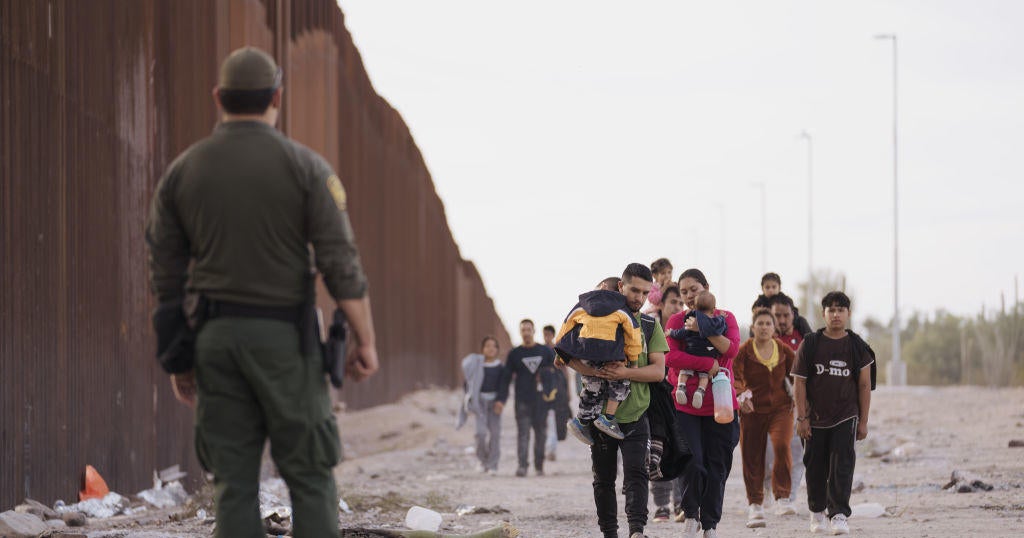
Arizonans to decide whether to make border crossing by noncitizens a state crime

Biden lauds vets 80 years after D-Day, warns of new threat to democracy

Russia expected to begin naval, air exercises in Caribbean, says U.S. official
- Skip to main content
- Keyboard shortcuts for audio player

The Americas
For a chance at a better life, venezuelans head toward the u.s. border.
Manuel Rueda
Large numbers of migrants from Venezuela are traveling thousands of miles to the U.S.-Mexico border, as their nation experiences food shortages and high inflation.
Copyright © 2022 NPR. All rights reserved. Visit our website terms of use and permissions pages at www.npr.org for further information.
NPR transcripts are created on a rush deadline by an NPR contractor. This text may not be in its final form and may be updated or revised in the future. Accuracy and availability may vary. The authoritative record of NPR’s programming is the audio record.

Weekly U.S.-Mexico Border Update: Asylum executive order, Mexico crackdown, Border Patrol centennial, South America migration

With this series of weekly updates, WOLA seeks to cover the most important developments at the U.S.-Mexico border. See past weekly updates here .
Due to an extended period of staff travel and commitments, we will produce Weekly Border Updates irregularly for the next two and a half months. We will resume a regular weekly schedule on July 26.
Support ad-free, paywall-free Weekly Border Updates. Your donation to WOLA is crucial to sustain this effort. Please contribute now and support our work.
THIS WEEK IN BRIEF:
An executive order limiting asylum access could come as early as next week.
After failing twice to enact such a measure through legislation, the Biden administration appears poised to issue an executive order that would allow U.S. border authorities to turn back or deport asylum seekers whenever the number of arriving migrants exceeds a specific threshold. The legal authority on which such an executive order would be based appears shaky, and there is a significant probability that it would not withstand challenges in the judicial system.
For fourth straight month, Mexico encounters almost exactly 120,000 migrants
Mexico’s government reported encountering or stopping 120,879 migrants during the month of April, a record that only slightly exceeds similar numbers reported every month since January. Well over half of April’s total were citizens of South American nations. Mexico’s stepped-up efforts to block migrants, which appear to involve aggressive busing into the country’s interior more than deportations or detentions, have left large numbers of migrants stranded there amid a notable drop in U.S. authorities’ migrant encounters.
On Border Patrol’s 100th anniversary, advocates focus on oversight and accountability
The U.S. Border Patrol was founded 100 years ago this week. Some analyses of the milestone have focused on the agency’s checkered human rights record. The Southern Border Communities Coalition and congressional Democrats, drawing attention to a recent GAO report’s findings, voiced concern that reforms aimed at more impartial oversight of use-of-force cases aren’t going far enough.
South America migration updates
Colombia voices skepticism about Panama’s new president’s promise to shut down Darién Gap migration. UNHCR data continue to show that many Venezuelan migrants in the Darién first sought to settle elsewhere in South America. Ecuadorians are skipping the Darién route by flying to El Salvador.
THE FULL UPDATE:
The Biden administration appears close to issuing an executive action that, when daily migration exceeds a certain level, would deny or severely limit the right to seek asylum for migrants apprehended on the U.S. side of the border with Mexico. Reports are converging on Tuesday (June 4) as a likely release date , though they caution that it continues to be a matter of internal White House discussion.
This “asylum shutdown” order would U.S. authorities to deport asylum seekers without affording them a chance to seek protection, perhaps making exceptions for those who can prove a very high threshold of fear of return. It would reportedly be triggered when U.S. authorities’ daily average of migrant encounters reaches 4,000 or 5,000, possibly including appointments made at ports of entry. Where possible, U.S. border authorities would deport migrants to Mexico after denying asylum access.
At busy moments along the border, then, the executive order would institute a policy similar to the pandemic-era Title 42 expulsions regime.
As part of a larger package of border-related measures, leadership of the U.S. Senate’s Democratic majority tried twice this year, without success, to add such an “asylum shutdown” authority to U.S. law on a temporary basis. (See WOLA’s February 9 and May 24 Border Updates, among others in the past six months.)
Without that law authorizing it, it is not clear how the Biden administration could use executive authority to abridge asylum at the border in this way. If President Biden “were to try to shut down portions of the border, the courts would throw that out, I think, within a matter of weeks ,” Sen. Chris Murphy (D-Connecticut), Senate Democrats’ chief architect of the unsuccessful border legislation, told CBS News’s Face the Nation .
Press reports indicate that the administration may resort to using Section 212(f) of the Immigration and Nationality Act (INA), which allows the President to bar the entry of a class of non-citizens considered “detrimental to the interests of the United States.” However, courts have cast doubt on whether 212(f) can in fact be used to remove an asylum seeker already on U.S. soil and asking for protection . Section 208 of the INA allows non-citizens to ask for asylum if they are “physically present” in the United States, regardless of how they arrived. (The Trump and Biden administrations’ Title 42 policy did allow expulsions of asylum seekers on public health grounds; federal courts did not agree with this but the policy expired before all appeals were exhausted.)
Earlier reporting, as WOLA’s May 24 Border Update reported, was already pointing to the White House issuing the order soon, after Mexico’s June 2 presidential elections. “The White House and a White House official told me that no final decisions have been made about an executive action that is potentially being considered,” reported PBS NewsHour’s Laura Barron-Lopez on May 28. “But sources told me that this specific executive action could come as early as next week after the Mexican elections on June 2.”
The “Mexican elections” milestone is no accident, as executing the order would depend on Mexico taking more U.S. returns of non-Mexican citizens . Mexico currently accepts U.S. deportations of up to 30,000 citizens of Cuba, Haiti, Nicaragua, and Venezuela every month under a May 2023 Biden administration rule, currently facing judicial challenges, that denies asylum to migrants who cross the border between ports of entry without having sought it elsewhere along their migration route.
Mexico’s recent cooperation extends to a big jump in migrant apprehensions and other stepped-up efforts to block routes to the U.S. border this year, as discussed in the next section below. It is not clear, though, whether Mexico’s government—which strongly opposed a restart of the Trump-era “Remain in Mexico” policy—would agree to take back a greater number of U.S. cross-border deportees under a new executive order. (U.S. aerial deportation, a costly program, is meanwhile unlikely to expand dramatically.)
Administration officials and some centrist Democrats continue calling for new limits on asylum. “The reality is that some people do indeed try to game the [asylum] system,” Homeland Security Secretary Alejandro Mayorkas told CBS News in an interview that aired May 28. “That does not speak to everyone whom we encounter, but there is an element of it, and we deal with it accordingly.” A CNN analysis meanwhile noted how Democratic legislators and candidates in tight races tend to favor placing limits on asylum at the border.
A year ago, Mexico’s authorities had never reported stopping (apprehending or “encountering”) more than 52,201 migrants in a month—a record set in October 2022. By November 2023, Mexico had shattered that record, stopping 97,969 migrants.
Now, Mexico has left even that record far behind. In April, for the fourth straight month, Mexico’s Migration Policy Unit reported encountering almost exactly 120,000 migrants. The 481,025 migrants Mexico reports stopping or encountering between January and April represent a 231 percent increase over the same period in 2023.

As has been typical in recent months, about one-third of Mexico’s April migrant encounters have been with citizens of Venezuela. In fact, the top three positions were South American nationalities: 10 percent were Ecuadorian and 8 percent were Colombian. Of all 120,879 of Mexico’s April encounters, 57 percent were with migrants from the South American continent. 7 percent were from countries in Asia (4,362) or Africa (4,291).

Of all nationalities with more than 1,000 April encounters, 3 have more than doubled in encounters since December 2023: Peru (+318%), Colombia (+217%), and El Salvador (+140%). El Salvador is the fastest-growing Central American nationality despite the reported popularity of its newly re-inaugurated president, Nayib Bukele.
Even as Mexico’s government reports encountering or stopping a record number of migrants, it has kept deportations to a minimum. It reported removing 1,779 migrants in April, 85 percent of them citizens of Guatemala and Honduras, and 10,427 so far this year (88% from Guatemala and Honduras). Mexico reports deporting one migrant for every 46 migrants encountered; in 2022 the ratio was one deportee for every 3.6 encounters.
Mexico has meanwhile all but ceased handing out humanitarian visitor cards ( Tarjetas de Visitante por Razones Humanitarias or TVRH), a document that some migrants used in the past to travel to the U.S. border. The Migration Policy Unit reports that Mexico furnished 888 humanitarian cards in the first 4 months of the year, down 98 percent from 51,095 in the first 4 months of 2023.
Record encounters, along with minimal deportations and transit documents, indicate that Mexico probably has an unprecedented number of migrants in its territory . Media continue to report about the government’s policy of busing large numbers of migrants, relocating them in the country’s south and elsewhere in its interior, far from the U.S. border. It is unclear how long Mexico can keep this up, or how long migrants stranded in the country will tolerate it. But for now, it has brought a notable reduction in the number of people reaching the U.S.-Mexico border.
The U.S. Border Patrol was founded 100 years ago this week, in 1924. Much coverage of the anniversary has focused on the agency’s complicated history.
The force’s current chief, Jason Owens, looked back on his career and told CBP’s Frontline magazine website that people considering a career as an agent should fully commit to it as a “calling.” Owens described tools using AI technology as a “force multiplier” for agents in the field. He added, “It would be so much better if the migrants went to the port of entry.” (CBP has capped port of entry capacity to receive asylum seekers at 1,450 people per day border-wide.)
A Mother Jones analysis highlighted aspects of the agency’s founding, at the urging of Texas Congressman Claude Benton Hudspeth, that reflect political and social tensions and contradictions about U.S. border security and immigration that remain in place today. “Chaos is not just the absence of a border; it is also the consequence of trying to maintain one,” noted the piece’s author, Tim Murphy.
“Revelations of some agents’ racist vitriol toward migrants, along with allegations of sexual misconduct against women employees, have rocked public trust in recent years,” noted a Christian Science Monitor analysis of Border Patrol’s centennial.
The Southern Border Communities Coalition commemorated the anniversary with a press conference in San Diego with loved ones of people killed, wounded, or racially profiled by agency personnel, none of whom has paid a penalty. The Coalition voiced skepticism about whether recent reforms, like the abolition of “Critical Incident Teams” that interfered with past investigations, are enough to achieve justice when Border Patrol agents commit human rights abuses.
Three San Diego-area House Democrats, along with Texas Rep. Joaquín Castro, sent a letter to leadership of DHS and CBP with questions about oversight of Border Patrol in human rights cases. Castro and Reps. Juan Vargas, Sara Jacobs, and Scott Peters called on the border agencies to follow recommendations in a May 13 Government Accountability Office (GAO) report , which found that Border Patrol’s Office of Professional Responsibility needed to improve the independence and impartiality of personnel investigating critical use-of-force incidents.
4,281 Border Patrol agents left the agency between October 2020 and April 2024, an annual attrition rate of about 6 percent, according to data obtained through the Freedom of Information Act by Anna Giaritelli of the conservative Washington Examiner . As Border Patrol underwent a surge of hiring in the years after September 11, 2001, a large number of agents are completing 20 years on the force and will soon be eligible for retirement , Giaritelli noted.
The article cited unnamed agents blaming the Biden administration for low morale; many say morale is low because they must release many apprehended migrants instead of detaining them.
- Colombia “would not agree with” Panamanian President-Elect José Raúl Mulino’s campaign promise to shut down the Darién Gap by deporting migrants who cross the treacherous jungle route straddling the two countries’ border, said Foreign Minister Luis Gilberto Murillo. Instead, “what we have to offer is more humanitarian outlets for this population that crosses through that area.” The Colombian news site Cambio looked at the logistical, human rights, and practical obstacles that would stand in the way of “shutting down” the Darién.
- The Ecuadorian daily Primicias reported on the increasing number of northbound Ecuadorian citizens who are avoiding the Darién Gap by flying to El Salvador , which does not require visas of visiting Ecuadorians. “Between January and April 2024, 43,408 travelers have left Ecuador [for El Salvador] and 4,112 have returned.” While seeking to migrate northward after arriving, many are subject to bribery, shakedowns, and mistreatment by Salvadoran and other corrupt Central American officials.
- Of 128 migrants transiting Panama interviewed by UNHCR earlier this month, 69 percent were from Venezuela, and of these, half came directly from Venezuela. Of the half of Venezuelans who had sought to live elsewhere in South America before migrating again, 60 percent had applied for legal status in those other countries, mainly Colombia, Peru, or Ecuador. Of all 128, 69 percent reported suffering physical insecurity (attacks, drownings, or falls) while crossing the Darién. 22 percent observed between 1 and 20 cadavers along the Darién trail .
- About a quarter of people in Venezuela are considering migrating, but of those, 47 percent would stay if the opposition were somehow allowed to win the country’s July 28 presidential elections, according to a Delphos poll reported by the Associated Press.
- Texas National Guard personnel fired at least one pepper irritant projectile on migrants at the Rio Grande in El Paso on Tuesday. At the time, the migrants—who included families with children—were separated from soldiers by a mass of fencing and concertina wire and posed no apparent threat of death or injury, calling into question Texas’s use-of-force guidelines. Texas’s Department of Public Safety has not commented on the incident, caught on video from the Ciudad Juárez side. “An unidentified Venezuelan man said two pepper balls struck him in the neck and side after he crossed the Rio Grande to plead with the soldiers to let families come across the razor wire,” Border Report reported . A Venezuelan mother and father told a videographer that they had “placed a piece of cardboard between two shrubs on the Mexican side of the river to protect their 1-year-old daughter from stray shots.” A photographer said that a guardsman shot at him twice while he filmed from the Mexican side. Migrants in Ciudad Juárez told EFE that the Texas personnel fire at them even “while they sleep.” They displayed bruises and un-ruptured projectiles. “In addition to aggressions with weapons, said migrants on the river, are constant verbal aggressions and the use of laser beams to damage the eyes.”
- The University of Texas’s Strauss Center released the latest in a long series of reports about asylum processing at U.S.-Mexico border ports of entry. “In May 2024, the ports of entry in Tijuana and Matamoros each had nearly 400 daily CBP One appointments, constituting 52 percent of all available slots,” while all official border crossings border-wide allowed about 100 “walk-ups” per day. The report discusses some of the difficulty that asylum seekers are experiencing in reaching the U.S.-Mexico border due to Mexico’s 2024 crackdown on migration.
- “Last week U.S. authorities expelled 200 migrants who crossed through Gate 40 of the border fence [in El Paso] and handed them over to the Mexican National Migration Institute (INM) in Ciudad Juárez, where they were warned that they would be returned to Chiapas, a state on Mexico’s southern border,” EFE reported .
- Throughout the Mexican northern-border state of Chihuahua, where Ciudad Juárez is the largest city, migrants are being caught up in a worsening wave of ransom kidnappings carried out by organized crime, France24 reported .
- EFE reported that fentanyl addiction is increasing in Ciudad Juárez, and some migrants in the Mexican border city are among those being drawn in.
- Georgia Sen. Jon Ossoff (D) visited the border in El Paso, Ciudad Juárez, and New Mexico. The centrist member of the Senate Intelligence Committee warned, “The threat of terrorism associated with unlawful entry to the United States is real.”
- “We’re gonna be barricading every area where people are crossing—until we get every area to have like this area is right now,” Texas Gov. Greg Abbott (R) told CBS News’s 60 Minutes ; “this area” was the heavily fortified Shelby Park in Eagle Pass. (Texas’s border with Mexico is about 1,200 miles long.) In the same segment, Raúl Ortiz, who headed Border Patrol between 2021 and 2023, criticized Abbott for not cooperating with Border Patrol, but also voiced dissatisfaction with the Biden administration: “I’ve never had one conversation with the president. Or the vice president, for that matter.”
- The International Refugee Assistance Project published a second update with information about the State Department-coordinated “Safe Mobility Office” (SMO) program. As of mid-May 2024, about 190,000 people had registered for appointments to seek legal migration pathways at SMOs, managed with UNHCR and IOM, in Colombia, Costa Rica, Ecuador, and Guatemala. The majority of SMO registrants—at least 110,000—were Venezuelans in Colombia. Over 21,000 registrants at all offices have been approved for resettlement under the State Department-run Refugee Admissions Program. The SMOs already refer a few registrants to legal migration pathways in Spain and soon Canada. CBS News reported that the offices may soon channel some Latin American migrants to Greece and Italy.
- The Texas Observer and the Arizona Center for Investigative Reporting published an in-depth investigation of vigilante groups’ and militias’ activities along the border. The piece highlighted these groups’ illegal actions, their relationships with law enforcement including some media-friendly right-wing sheriffs and some Border Patrol agents, and the dangers they pose to migrants and the rule of law.
- Border Patrol’s Tucson Sector (7,400) saw more migrant apprehensions than its San Diego Sector (6,157) last week, according to tweets from the sector chiefs . (San Diego later rose somewhat, to 6,777, during the week of May 22-28.) For a period of eight weeks, San Diego had measured the most migration of all nine of Border Patrol’s U.S.-Mexico border sectors, for the first time since the late 1990s. But San Diego was eclipsed after experiencing a 39 percent drop in migration over 3 weeks. (That drop eased to 32 percent over 4 weeks following San Diego’s slight May 22-28 increase.)
- Former Border Patrol agent Hector Hernandez was sentenced to 87 months in federal prison for taking bribes to smuggle methamphetamine and migrants across the U.S.-Mexico border. Hernandez had been employed by Border Patrol in San Diego.
Related Content
Weekly u.s.-mexico border update: border act fails, migration keeps dropping, texas updates, weekly u.s.-mexico border update: april dip in migration, drug seizure data, investigations published, weekly u.s.-mexico border update: mexico blocks migration, u.s. legislation, migrant removals, nationalities, weekly u.s.-mexico border update: migration declined in march, mayorkas impeachment thwarted, darién gap, national guard in texas, weekly u.s.-mexico border update: trends from panama to u.s., possible executive action on asylum, dhs hearings in congress.

An official website of the United States government
Here’s how you know
Official websites use .gov A .gov website belongs to an official government organization in the United States.
Secure .gov websites use HTTPS A lock ( Lock A locked padlock ) or https:// means you’ve safely connected to the .gov website. Share sensitive information only on official, secure websites.
- Press Releases
DHS Announces New Migration Enforcement Process for Venezuelans
Venezuelans who seek to enter the U.S. illegally will be returned to Mexico; New lawful pathway created for some Venezuelans
WASHINGTON – Today, as part of the Biden-Harris Administration’s ongoing work to build a fair, orderly, and secure immigration system, the Department of Homeland Security (DHS) is announcing joint actions with Mexico to reduce the number of people arriving at our Southwest border and create a more orderly and safe process for people fleeing the humanitarian and economic crisis in Venezuela. Almost four times as many Venezuelans as last year attempted to cross our southern border, placing their lives in the hands of ruthless smuggling organizations. Meanwhile, irregular migration from northern Central America is down by a quarter from the level encountered last year. The actions the United States and Mexico are announcing today are intended to address the most acute irregular migration and help ease pressure on the cities and states receiving these individuals. Effective immediately, Venezuelans who enter the United States between ports of entry, without authorization, will be returned to Mexico. At the same time, the United States and Mexico are reinforcing their coordinated enforcement operations to target human smuggling organizations and bring them to justice. That campaign will include new migration checkpoints, additional resources and personnel, joint targeting of human smuggling organizations, and expanded information sharing related to transit nodes, hotels, stash houses, and staging locations. The United States is also planning to offer additional security assistance to support regional partners to address the migration challenges in the Darién Gap. Our comprehensive effort to reduce the irregular migration of Venezuelans also includes a new process to lawfully and safely bring up to 24,000 qualifying Venezuelans into the United States. The United States will not implement this process without Mexico keeping in place its independent but parallel effort to accept the return of Venezuelan nationals who bypass this process and attempt to enter irregularly. “These actions make clear that there is a lawful and orderly way for Venezuelans to enter the United States, and lawful entry is the only way,” said Secretary of Homeland Security Alejandro N. Mayorkas . “Those who attempt to cross the southern border of the United States illegally will be returned to Mexico and will be ineligible for this process in the future. Those who follow the lawful process will have the opportunity to travel safely to the United States and become eligible to work here.” This effort is intended to enhance border security by reducing the number of Venezuelans seeking to irregularly enter the United States. It is derived from the success of the Uniting for Ukraine (U4U) program, which decreased flows at the border by creating an orderly process for the entry of Ukrainians fleeing Russia’s invasion of Ukraine. DHS will closely monitor the implementation of this process, and Mexico’s independent and parallel efforts, and may consider expanding it in the future. To be eligible, Venezuelans must:
- have a supporter in the United States who will provide financial and other support;
- pass rigorous biometric and biographic national security and public safety screening and vetting; and
- complete vaccinations and other public health requirements.
Venezuelans are ineligible if they:
- have been ordered removed from the United States in the previous five years;
- have crossed without authorization between ports of entry after the date of announcement;
- have irregularly entered Mexico or Panama after the date of announcement, or are a permanent resident or dual national of any country other than Venezuela, or currently hold refugee status in any country; or
- have not completed vaccinations and other public health requirements.
Venezuelans should not travel to Mexico to pursue entry into the United States. Venezuelans approved via this process will be authorized on a case-by-case basis to travel to the United States by air directly to an interior port of entry, thus relieving pressure at the border. Once in the United States, they will be eligible to apply for work authorization. DHS will administer the process, working with communities and other partners. Any U.S.-based individual with lawful status, including representatives of businesses or other organizations or entities, can support a potential beneficiary from Venezuela. A supporter must prove that they have the means to provide financial and other support for the beneficiary. In the coming days, potential supporters can apply to DHS to support individual eligible Venezuelans via www.uscis.gov/Venezuela . Individuals and representatives of organizations seeking to apply as a supporter must declare the organization’s financial support and they must pass security background checks to protect against exploitation and abuse. The State Department will also engage in a robust in-region messaging campaign to communicate about this new process and the consequences of attempting irregular entry. More information will be available at www.uscis.gov/Venezuela in the coming days. Today’s actions are part of the Biden-Harris Administration’s ongoing efforts to reduce irregular migration throughout the Western Hemisphere, including through the U.S. Strategy for Addressing the Root Causes of Migration and the multinational Los Angeles Declaration on Migration and Protection. The process announced today is one more element of the United States’ multilateral approach to addressing irregular migration that is impacting countries throughout Latin America, and it is premised on pairing increased enforcement in response to irregular immigration with the development of lawful and safe pathways for qualifying individuals. Venezuelans have been migrating throughout the hemisphere since approximately 2014, yet the level of irregular migration of Venezuelans has increased dramatically throughout the hemisphere in the past several years. There are currently 2.4 million Venezuelans residing in Colombia. More than 25% of Venezuela’s population has left the country. The United States is seeing a rising rate of Venezuelans encountered at our border over the past two years, which has surged in the last few months. Average monthly unique encounters of Venezuelan nationals at the land border totaled 15,494 in FY 2022, rising further to over 25,000 in August and 33,000 in September, compared to a monthly average of 127 unique encounters from FY 2014–2019. Of note, unique encounters of Venezuelan nationals rose 293 percent between FY 2021 and FY 2022, while unique encounters of all other nationalities combined increased 45 percent. Panama is currently seeing more than 3,000 people, mostly Venezuelan nationals, crossing into its territory from Colombia via the Darién jungle each day. The United States, in partnership with Mexico, also is committing to further expanding lawful labor pathways for Mexican and Northern Central American nationals. This last year, the United States doubled the number of H-2 visas issued to nationals of the Northern Central American countries of Guatemala, Honduras, and El Salvador. Today, we are announcing the largest H-2B supplemental in history for Fiscal Year 2023: nearly 65,000 new H-2B visas, including a set-aside of 20,000 to nationals of Northern Central American countries and Haiti. Historically, approximately 90% of these visas have been used by Mexican nationals. This increase is coupled with strong measures to protect both U.S. and H-2B workers. Concurrent with this announcement, the Biden-Harris Administration is launching a White House-led Worker Protection Task Force to ensure ethical recruitment and dignified labor standards for foreign workers alongside protections for U.S. workers. The United States also is renewing its commitment to tackle the root causes of migration and support countries in the region that are most impacted by these flows. For that reason, the United States has announced nearly $817 million in new assistance since September 2022 under the Los Angeles Declaration on Migration and Protection. This includes more than $240 million in new regional humanitarian and security assistance, $376 million in additional humanitarian assistance for people affected by the Venezuela regional crisis, and more than $199 million in additional humanitarian assistance for Mexico and Central America.
- Secretary Alejandro Mayorkas
- Today's news
- Reviews and deals
- Climate change
- 2024 election
- Fall allergies
- Health news
- Mental health
- Sexual health
- Family health
- So mini ways
- Unapologetically
- Buying guides
Entertainment
- How to Watch
- My watchlist
- Stock market
- Biden economy
- Personal finance
- Stocks: most active
- Stocks: gainers
- Stocks: losers
- Trending tickers
- World indices
- US Treasury bonds
- Top mutual funds
- Highest open interest
- Highest implied volatility
- Currency converter
- Basic materials
- Communication services
- Consumer cyclical
- Consumer defensive
- Financial services
- Industrials
- Real estate
- Mutual funds
- Credit cards
- Balance transfer cards
- Cash back cards
- Rewards cards
- Travel cards
- Online checking
- High-yield savings
- Money market
- Home equity loan
- Personal loans
- Student loans
- Options pit
- Fantasy football
- Pro Pick 'Em
- College Pick 'Em
- Fantasy baseball
- Fantasy hockey
- Fantasy basketball
- Download the app
- Daily fantasy
- Scores and schedules
- GameChannel
- World Baseball Classic
- Premier League
- CONCACAF League
- Champions League
- Motorsports
- Horse racing
- Newsletters
New on Yahoo
- Privacy Dashboard
Mexican president says Venezuela, Cuba accept deported migrants from Mexico
MEXICO CITY (Reuters) - Countries including Venezuela and Cuba accept migrants deported by U.S. officials from Mexico, the Mexican president said on Thursday, but he added that he would prefer that Washington enter into direct deportation agreements with those nations.
(Reporting by Ana Isabel Martinez and David Alire Garcia; Editing by Valentine Hilaire)
Recommended Stories
What’s in biden's 3-phase plan to end the war in gaza.
The plan includes a six-week ceasefire and full Israeli withdrawal.
Iranian president, 7 others, have died in a helicopter crash: Here's what we know — and what we don't
Iran's president has died in a helicopter crash. Here's what we know so far — and what we don't.
Norway, Ireland and Spain say they will recognize a Palestinian state, angering Israel. What does this mean?
The historic but largely symbolic move comes amid growing international outrage over reports of mounting civilian deaths in Gaza from Israel’s war against Hamas.
Sparks rookie Cameron Brink: 'There's a privilege' for WNBA's younger white players
The Sparks rookie had plenty to say about her WNBA rookie class, headlined by Caitlin Clark.
Angel Reese's 'weak' ejection from Sky-Liberty game draws attention, offer from Bulls' Lonzo Ball
Reese was ejected after two very quick whistles from referee Charles Watson.
Vikings reveal 'Winter Warrior' alternate all-white uniforms to be worn on Week 15
The Minnesota Vikings revealed their all-white "Winter Warrior" uniforms that the team will wear for Week 15's matchup with the Chicago Bears.
Sky's Chennedy Carter has 'no regrets' about foul on Caitlin Clark; Angel Reese will 'take the bad guy role'
The Sky have broken their silence about the flagrant foul on Caitlin Clark, and they had a lot to say.
Larry Allen, Cowboys legend and Pro Football Hall of Famer, dies at 52
Allen was a seven-time first-team All-Pro and part of the Cowboys' Super Bowl XXX winning team.
Paul Skenes blows away Shohei Ohtani, who returns the favor in his next at-bat
The Dodgers-Pirates matchup lived up to its billing.
Rivian's path to survival is now remarkably clear
Rivian has had a lot on its plate as it transitioned from pitch mode to selling EVs. It created an electric pickup and an electric SUV while prepping a monster IPO. It now plans to sell an even cheaper SUV that could make Rivian a dominant EV player for years to come.
2025 Toyota Crown Signia First Drive: Venza replacement puts efficiency and fashion first
Our first drive review of the 2025 Toyota Crown Signia where we tell you all about it and give initial driving impressions.
Emma Hayes' first big USWNT conundrum: Olympic roster cuts
At least two players who started for the USWNT over the past week will have to be cut for the Olympics. Might Alex Morgan or Rose Lavelle be on the roster bubble?
Opposing players aren't fond of Caitlin Clark ... which should be good for the WNBA
Watching Clark fight through adversity and rack up rivals will only bring more eyeballs to the league.
Beware the retirement savings 'time bomb,' tax expert warns
Taxes are the "retirement time bomb," according to one tax expert. Here's what you can do now.
Chiefs' Harrison Butker may be removed from kickoffs due to new NFL rules
Kansas City Chiefs special teams coach Dave Toub said kicker Harrison Butker may be removed from kickoffs. But not because of Butker's recent controversial remarks.
Coaching the Lakers is a hard job to pass up, except maybe Dan Hurley should
History is littered with successful college basketball coaches who took a shot at leaping to the NBA but failed spectacularly.
Yes, Marshall's has an online store — and we found 10 summer steals under $50
Tommy Bahama, Ralph Lauren, Jantzen: It's a treasure trove of deals — like going in person, but better!
Investors don't want a stronger economy — they want rate cuts: Morning Brief
Stock market bulls don't see the portfolio party ending under a new interest rate regime.
TE Darren Waller reportedly expected to retire ahead of Giants' mandatory minicamp
The Giants acquired Waller in a March 2023 trade.
Dan Hurley: From a bingo hall to coach of the Los Angles Lakers?
Dan Hurley may be headed to the Lakers. It was probably inevitable.
A migrant family is undeterred by Biden’s push to restrict asylum
There was no turning back for a Venezuelan mother and her two children after an exhausting odyssey to reach the border.

CIUDAD JUÁREZ, Mexico — Ingrid Orasma had spent weeks trekking through Mexico by foot, train and bus with her two young sons. She reached the border Tuesday only to find out the man she calls “Papa Biden” had imposed new restrictions on how many asylum seekers like her are allowed to stay in the United States.
The thought of remaining a day longer in Mexico was unbearable. Along the journey, she said, Mexican authorities had robbed the group of friends her family was traveling with, pulled them off trains and abandoned them in the desert. She feared what getting stuck south of the U.S. border might bring next.
“To Mexican immigration officials, we are animals,” Orasma, 47, said. “It’s been abuse and mistreatment at every step.”
So on Wednesday, as President Biden’s new asylum policy went into effect, the Venezuelan woman and her family headed to the border, hoping immigration officials might still let them in. They waited to board a bus toward the border wall. And they prayed.
The stakes were high: Migrants deemed ineligible for protection will be returned to their home countries or Mexico unless they express a convincing fear of harm that qualifies them for an exemption under tougher screening procedures.
Orasma had a long list of complaints about life in Venezuela. But it was unclear if any of them would be enough to convince an immigration officer that they should get to stay.
“What options do I have?” she asked, caressing her 10-year-old son as they took shelter from the blistering heat under the shade of a tree. Sweat glistened on her forehead. The only thing left to do, she decided, was to try to cross and “leave it to God.”
In Venezuela, their life felt like a steady spiral downward.
There was the government that permitted little dissent. The blackouts that made running any kind of business a losing prospect. The fear that came with expressing a contrarian viewpoint. Her salary as a schoolteacher was hardly sufficient to raise two children on her own.
Friends had made it to the United States. And cousins in New Jersey had offered them a place to stay. Why shouldn’t they leave, too?
Two months ago, they packed their bags and set off on a quest to reach the United States. They traveled first toward Central America and reached Mexico without any major complications. But as soon as they reached the last country on their journey, their troubles began.
There were long nights where the only place they could find or afford to sleep was the floor of a plaza or outside a gas station. During one 20-day stretch, no one offered them a ride and they had no money for a bus, so they’d walked. Her two children — the eldest of which is 15 — developed painful blisters on their feet.
As the trek to Mexico’s northern border stretched on, her sons had grown steadily skinnier.
But nothing, she said, shocked her quite as much as the treatment they experienced at the hands of Mexican authorities. The group of friends they made along the way tried to protect one another, but often, they were defenseless. When they managed to get on a train recently, officials found them and forced them off, she said, leaving them in a desert.
The only way they’d managed to find their way out was by following the faint glow of lights from a town on the horizon.
All along, she’d predicted, U.S. immigration officials would let them in. The Biden administration had repeatedly shown generosity toward Venezuelan migrants. A new parole program permitted several thousand to enter the country each month, though they’d need to apply from Venezuela. Still, thousands of others had had success making long trips through Central America and Mexico and surrendering to officials at the border.
She figured her family would be treated the same. But when they finally reached Ciudad Juárez on Tuesday, news began trickling in about Biden’s new policy. U.S. immigration officials would start sending migrants back.
The next day, Orasma and her friends gathered under a tree in the city’s downtown, trying to find news stories and social media posts that might offer them some hint of what to do next. The new policy blocking migrants’ access to the U.S. asylum system when illegal border crossings are at emergency levels had gone into effect, and officials were already starting to enforce it.
Orasma said she tried to make an appointment with an immigration officer through the Biden administration’s CBP One app. But there aren’t enough slots to meet demand.
From her perspective, there was just one option.
“We want Papa Biden to open the door,” she said.
Over the last two months, the group of Venezuelans, Mexicans and Hondurans Orasma and her sons were traveling with had built an indestructible bond. They affectionately referred to one another by nicknames. Orasma was known as “Mama.”
Their plan: Take a bus somewhere close to a stretch of the Rio Grande other migrants had told them was near a border gate where they could easily surrender to officials on U.S. soil.
At this point in their journey, they were running out of money. Bus drivers across northern Mexico were barring immigrants from boarding to avoid trouble with authorities.
They stood at a bus stop and waited.
A driver stopped and opened his door. But when they explained where they were going, he shook his head and drove away. Twenty minutes passed. No one would take them.
“Just the thought of coming back to Mexico,” Marco Morales, 46, a teacher from Venezuela traveling with the group, said. He paused for a moment. “It makes we want to cry.”
Then came a refurbished school bus painted green. The driver stopped and agreed to allow them on for 40 pesos each — a little more than two dollars. They would try to get to “La X,” a giant sculpture in the form of an X near the border wall that migrants use as a landmark to indicate they are close to Gate 36.
The bus driver was surprisingly kind, calling the group to board again after they initially got off at the wrong stop.
“If you get off here you’ll have to walk too far,” he said.
“And there’s no police there, right?” Morales asked.
The driver said there was no one there last time he’d checked.
They boarded again, spreading themselves across the bus between Mexicans heading home from work and others dozing off in the 100-degree heat. The children couldn’t help but fall asleep as the bus rolled eastward. Songs from the band Queen blared over the radio.
“Los del 36!” the driver suddenly yelled, snapping them awake. They stood up and grabbed their bags of water bottles and small backpacks, their only remaining belongings. No one knew which direction led to the border but they figured heading north would take them there.
The group navigated there way through traffic-filled highways, dodging angry drivers who honked their horns. They passed giant fenced-in factories for foreign manufacturers. When they reached a carwash, a worker yelled out to them to stop.
Orasma felt her heart stop. The group froze, confused.
The man ran inside a nearby fast-food restaurant, grabbed a bag and handed it to them. There were burritos inside, spicy ones. They hadn’t eaten much at all that day. Orasma’s boys thanked the man with a smile.
When they finally reached the river, a levee blocked their view. A man known as Flaco because of his tall and skinny frame approached. He craned his neck and peered over the top.
“It’s clear!” he yelled, barely audible over the traffic. “Vamanos!”
They walked, ran and skipped toward the edge of the Rio Grande, no Mexican federal troops in sight. The river had been reduced to a mere creek by the hot weather and drought.
A Texas National Guard Humvee purred across the water alongside a state trooper’s black and white SUV. Rows of razor wire lined the river on the other side. The dry river silt they were leaning against as they hid in the nearby brush was so hot it burned their backs if they stayed still for too long.
Orasma wasn’t sure what to do next. She was a mother with children. Would border agents really turn them back?
Her 15-year-old son took out his phone and shot a video zooming through the tree leaves toward the rust-colored panels of border wall. He uploaded on WhatsApp to share with friends and family.
At the bottom of the image he captioned it: “Todo con el favor de dios.”
“May we have God’s blessing.”
Then he took a photograph of himself. He was straight faced and tired. But he gave a thumbs-up. He typed in two prayer emojis and an image of the United States flag. The border was in sight. They would try.


Americans urged to avoid Venezuela: Level 4 travel warning remains in place
There's another vacation destination to cross off your travel list.
The U.S. Department of State has reissued a travel warning for a popular South American spot with a Level 4: Do Not Travel Advisory to all Americans.
The Department of State is urging Americans to not travel to Venezuela due to crime, civil unrest, kidnapping and the arbitrary enforcement of local laws.
The reissue comes after a routine, periodic review with minor edits pursuant to Department of State standard processes, the advisory said.
Violent crimes, such as homicide, armed robbery, kidnapping and carjacking are common in Venezuela. There is also a high risk of Americans being wrongfully detained. Terrorism and poor health infrastructure have also been recorded.
Since 2019, the U.S. Department of State withdrew all diplomatic personnel from U.S. Embassy in Caracas and has no ability to provide emergency services to U.S. citizens in Venezuela.
If you decide to to travel to Venezuela, despite the advisory, here are some precautions to follow, according to the State Department:
- Avoid all land border crossings into Venezuela on the Colombian border.
- Ensure you have a valid Venezuelan visa. Visas are not available upon arrival.
- Be prepared for the high risk of indefinite detention without consular access.
- Draft a will and designate appropriate insurance beneficiaries and/or power of attorney.
- Develop a communication plan with family and/or your employer or host organization. Establish a “proof of life” protocol with your loved ones, so that if you are taken hostage, your loved ones know specific questions (and answers) to ask the hostage-takers to be sure that you are alive (and to rule out a hoax).
- Have a contingency plan in place that does not rely on U.S. government assistance.
- Keep travel documents up to date and easily accessible.
- Avoid travel between cities, or between Simón Bolívar International Airport and Caracas at night.
- Do not take unregulated taxis from the Maiquetia “Simón Bolívar” International Airport and avoid ATMs in this area.
- Consider hiring a professional security organization.
This article originally appeared on Asbury Park Press: Americans urged to avoid Venezuela: Level 4 travel warning remains in place

- International

Israel-Hamas war

Hunter Biden's gun trial
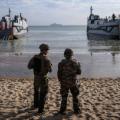
D-Day 80th anniversary
Claudia Sheinbaum projected to be Mexico's first woman president
By Kathleen Magramo, Maureen Chowdhury, Matt Meyer, Antoinette Radford and Melissa Macaya, CNN
The count: Mexico Elections 2024
Mexico's outgoing president says he will not try to influence sheinbaum in naming future officials.
From CNN's Abel Alvarado in Atlanta
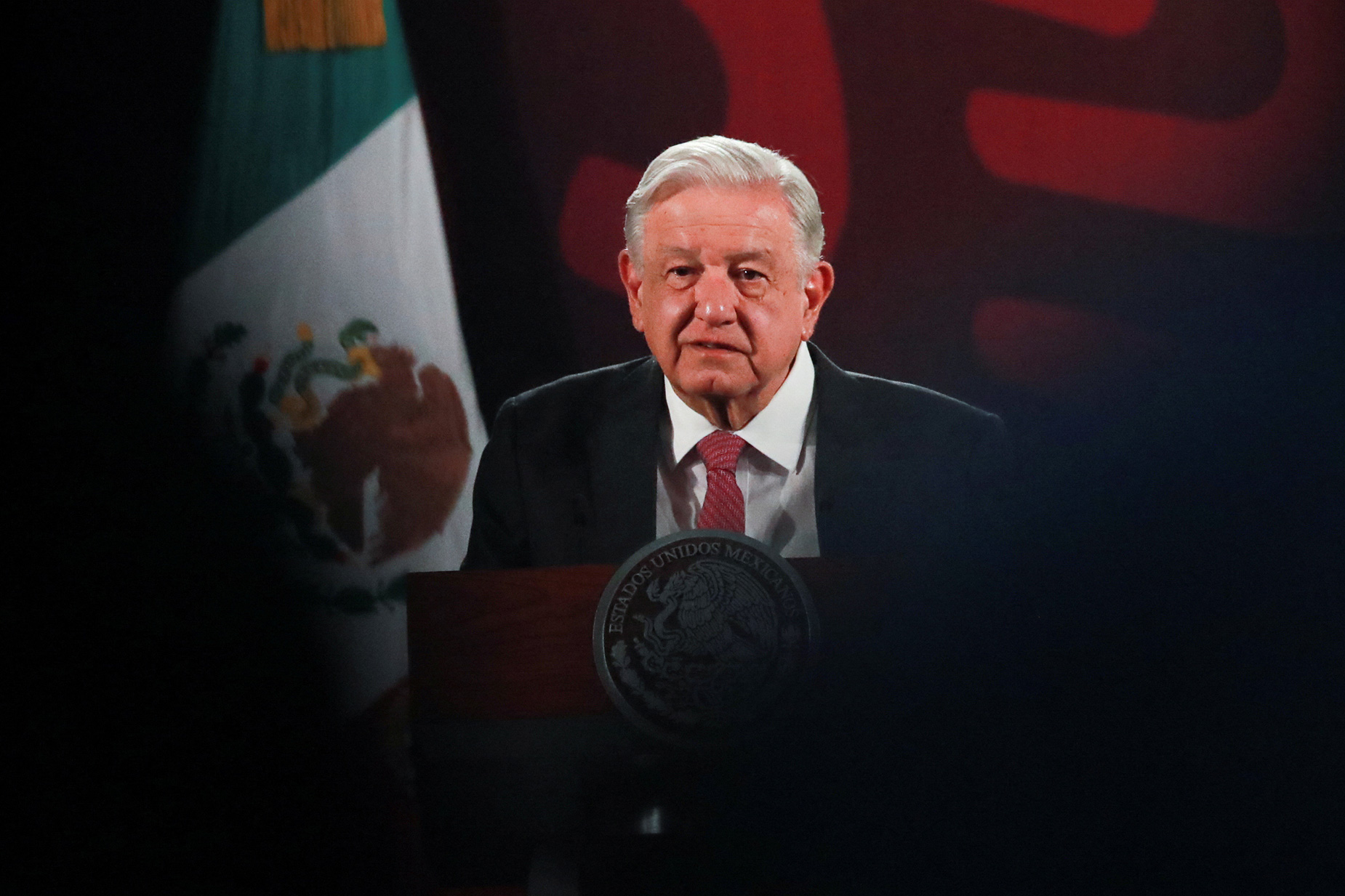
Mexico’s President Andrés Manuel López Obrador said he will not influence newly elected president Claudia Sheinbaum in naming future officials for the country after Sunday’s landslide victory.
“She (Sheinbaum) is the one empowered to make all the decisions. I am not going to influence anything,” López Obrador said during his morning presser on Monday.
“She is going to choose her team,” he added.
However, he suggested that changes would come with the new president because it was part of the “transformation” he started for the country when he took office nearly six years ago.
López Obrador also said he may discuss constitutional reforms with Sheinbaum during the transition period but made it clear that he didn’t “want to impose anything.”
Sheinbaum will take office on October 1. Her term will last six years.
López Obrador, who is Sheinbaum’s political mentor, congratulated her on the win.
“We already spoke yesterday (Sunday); I congratulated her. I am very happy because imagine what it means to hand over the presidency to a woman after 200 years of only men ruling Mexico,” the president said.
The president said that once he hands over the presidential band, he plans to retire from political life entirely and will do so with “a lot of satisfaction.”
“Let it be heard loud and clear: after I finish my term in office, I will retire, and I will never again participate in any public or political act,” he said.
Biden congratulates Sheinbaum for her historic win
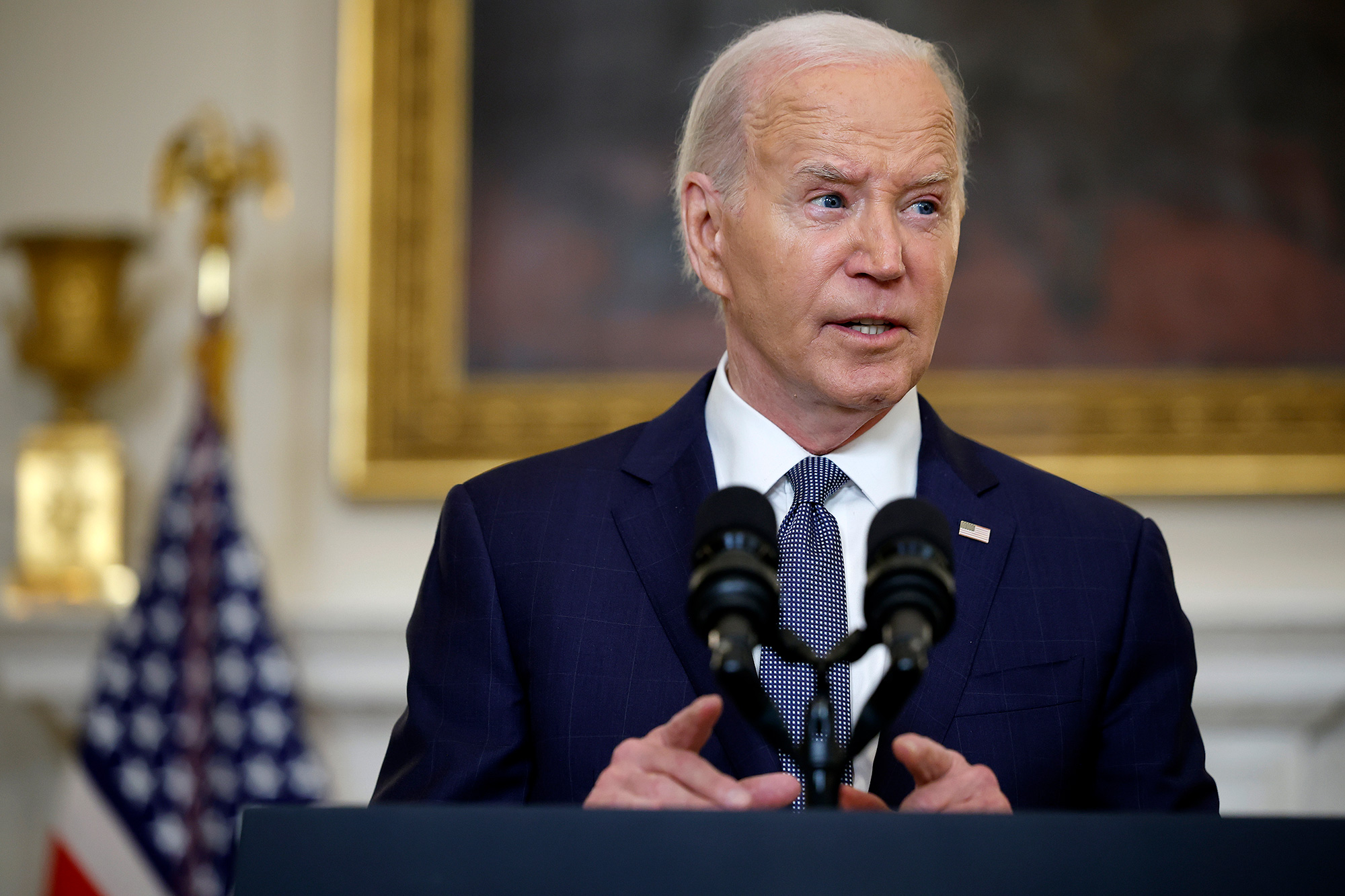
US President Joe Biden congratulated Claudia Sheinbaum on her historic presidential win as Mexico's first woman to lead the country's government.
"I look forward to working closely with President-elect Sheinbaum in the spirit of partnership and friendship that reflects the enduring bonds between our two countries," he said in a statement Monday. "I expressed our commitment to advancing the values and interests of both our nations to the benefit of our peoples."
Read Biden's full statement:
"I congratulate Claudia Sheinbaum on her historic election as the first woman President of Mexico. I look forward to working closely with President-elect Sheinbaum in the spirit of partnership and friendship that reflects the enduring bonds between our two countries. I expressed our commitment to advancing the values and interests of both our nations to the benefit of our peoples. I also congratulate the Mexican people for conducting a nationwide successful democratic electoral process involving races for more than 20,000 positions at the local, state, and federal levels."
Mexican peso falls against the US dollar
From CNN's Krystal Hur
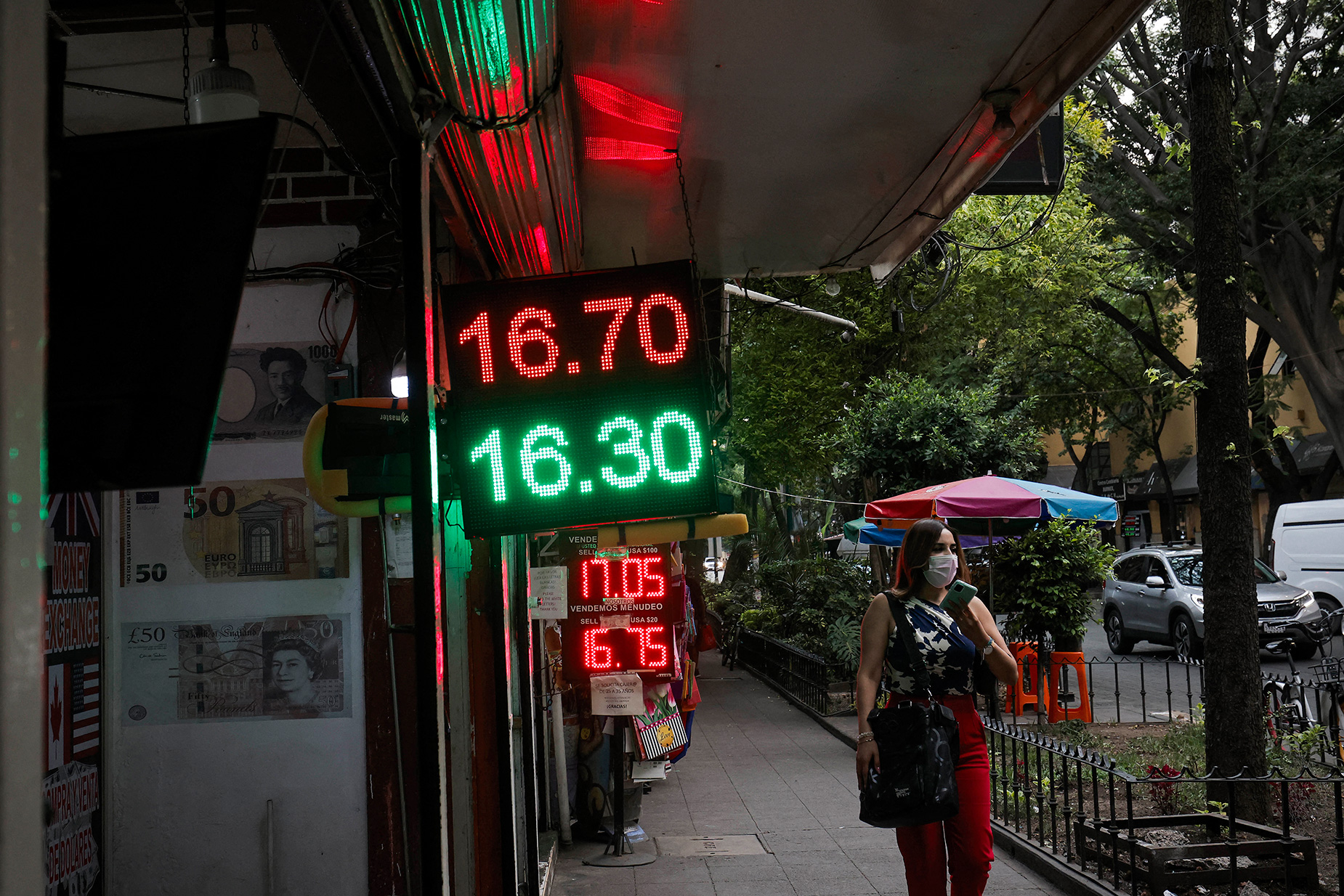
The Mexican peso slipped roughly 3% against the US dollar Monday morning.
It comes after Claudia Sheinbaum's projected landslide victory, which has raised concerns that the ruling Morena party will be able to pass more ambitious constitutional reforms, many of which had been sought by outgoing President Andrés Manuel López Obrador.
"Sheinbaum is perceived as more of a technocrat than AMLO, and she also has a background in climate science. Both offer potential shifts in Mexican policy," wrote Bespoke Investment Group researchers in a Monday note.
Latin American leaders celebrate Claudia Sheinbaum's projected win
From CNN's Abel Alvarado
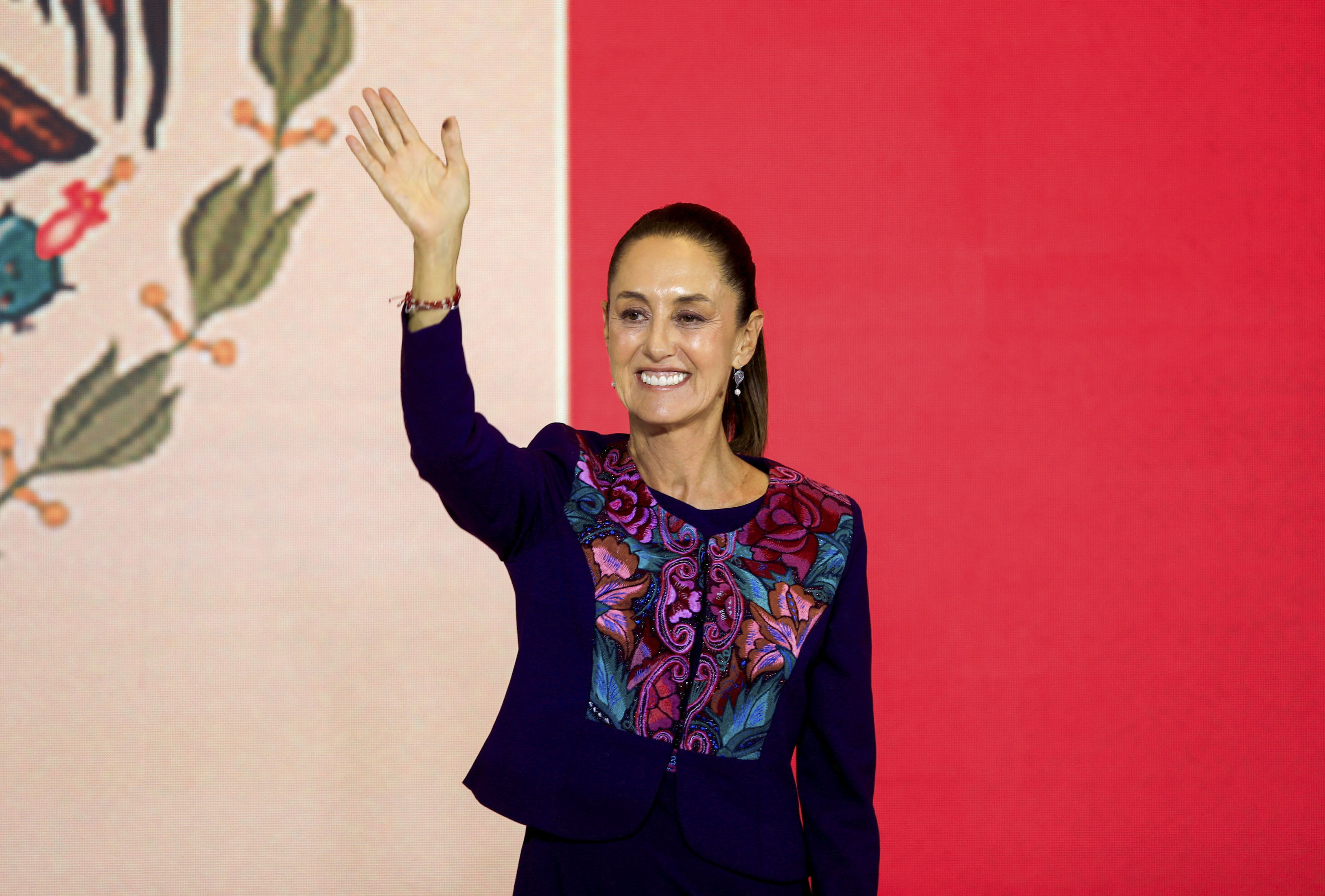
Latin American leaders are celebrating Claudia Sheinbaum's projected win as Mexico's president with leaders referencing a common theme — that her appointment would hopefully see strengthened relationships between countries on the continent.
Sheinbaum will face several challenges, including security, organized crime, energy and immigration, and would also set the tone for the pivotal US-Mexico bilateral relationship .
- Cuban President Miguel Diaz-Canel said in a post on X: "We wish her success in her management, the first for a woman in that position."
- Honduran President Xiomara Castro extended her "sincere congratulations" to Sheinbaum, "as the first female president of Honduras" on X . Castro said she spoke to Sheinbaum following her victory and agreed "to work together for the unity of Latin America and the Caribbean."
- Venezuelan President Nicolas Maduro called her win a "great victory for the Great Homeland. I hug you! Long live Mexico!"
- Bolivian President Luis Arce congratulated her on X and added that they "salute salute all the Mexican people for their democratic vocation and broad participation in the electoral process."
- Colombian President Gustavo Petro described Sheinbaum's appointment as "a triumph for the Mexican people and for their democracy."
- Costa Rica 's presidency referred to the two countries as "brother countries" and congratulated Sheinbaum on her appointment.
Millions turn out for largest election in Mexico's history
From CNN's Tara John and CNN en Español
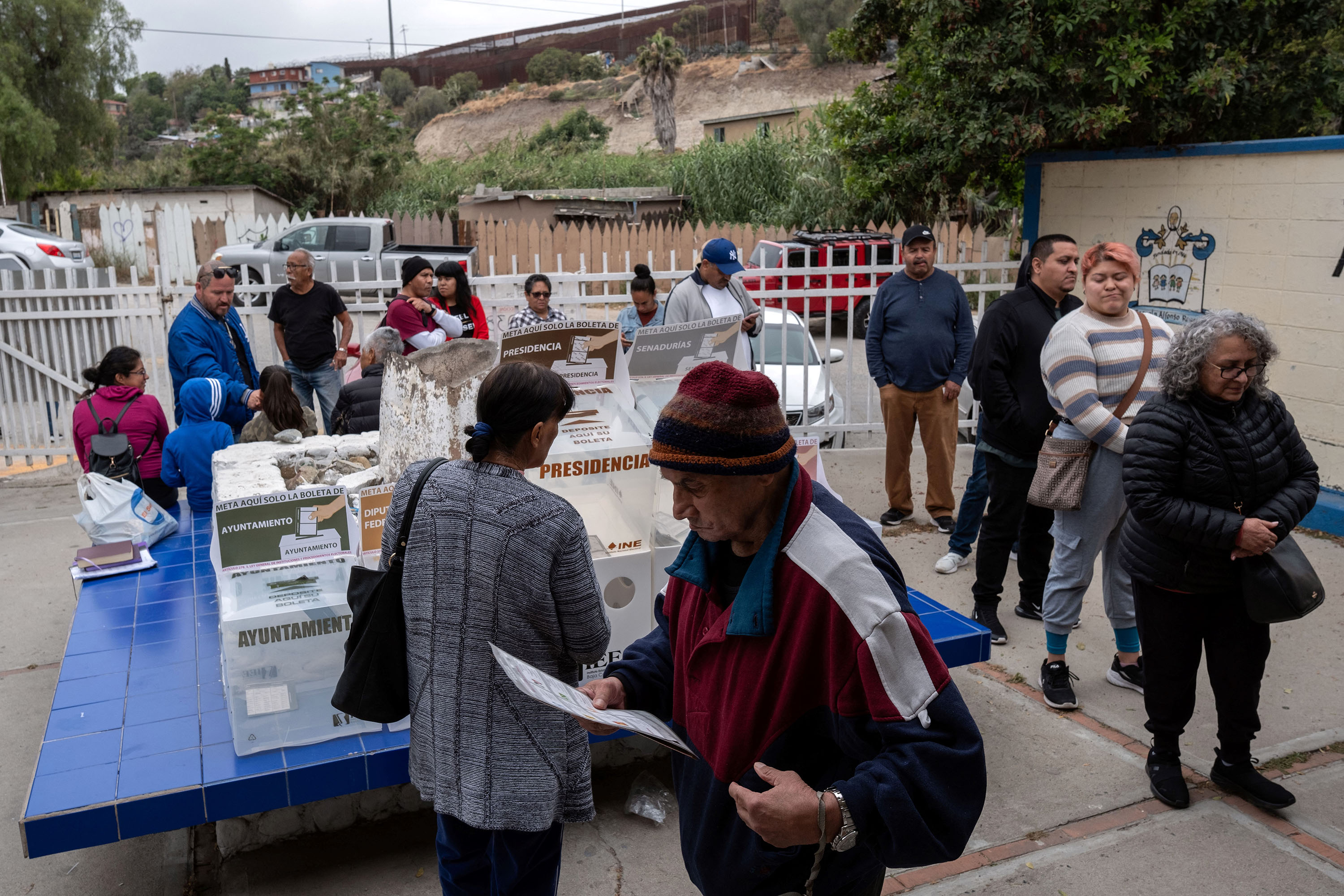
Sunday’s poll was the largest election in the country’s history. More than 98 million voters were registered to cast a ballot, and 1.4 million Mexicans were eligible to vote abroad.
In addition to the presidency, more than 20,000 positions were being contested by an estimated 70,000 candidates vying to become senators, mayors and governors.
But the elections were plagued by immense violence . There have been more than 20 political killings since September, according to the Mexican government. By some estimates though, that number is even higher. According to Mexican consultancy firm Integralia, at least 34 candidates were murdered in the run-up to the vote.
Voting was suspended for several hours on Sunday in the southeastern Mexican town of Coyomeapan due to violence at the polling centers, according to state electoral authorities.
And while the murder rate fell in Mexico between 2019 and 2022 , in absolute numbers the country is still reeling from historically high levels of around 30,000 homicides each year. The true number is likely higher, experts say.
The violence appeared to have been a top concern for voters as cartels extend their grip through Mexico.
Claudia Sheinbaum has been coy about her security proposals but has pointed to her record as Mexico City mayor, when, according to her team, she improved the police force’s working conditions and intelligence-gathering abilities.
Outgoing Mexican president congratulates Sheinbaum
From CNN's Mia Alberti
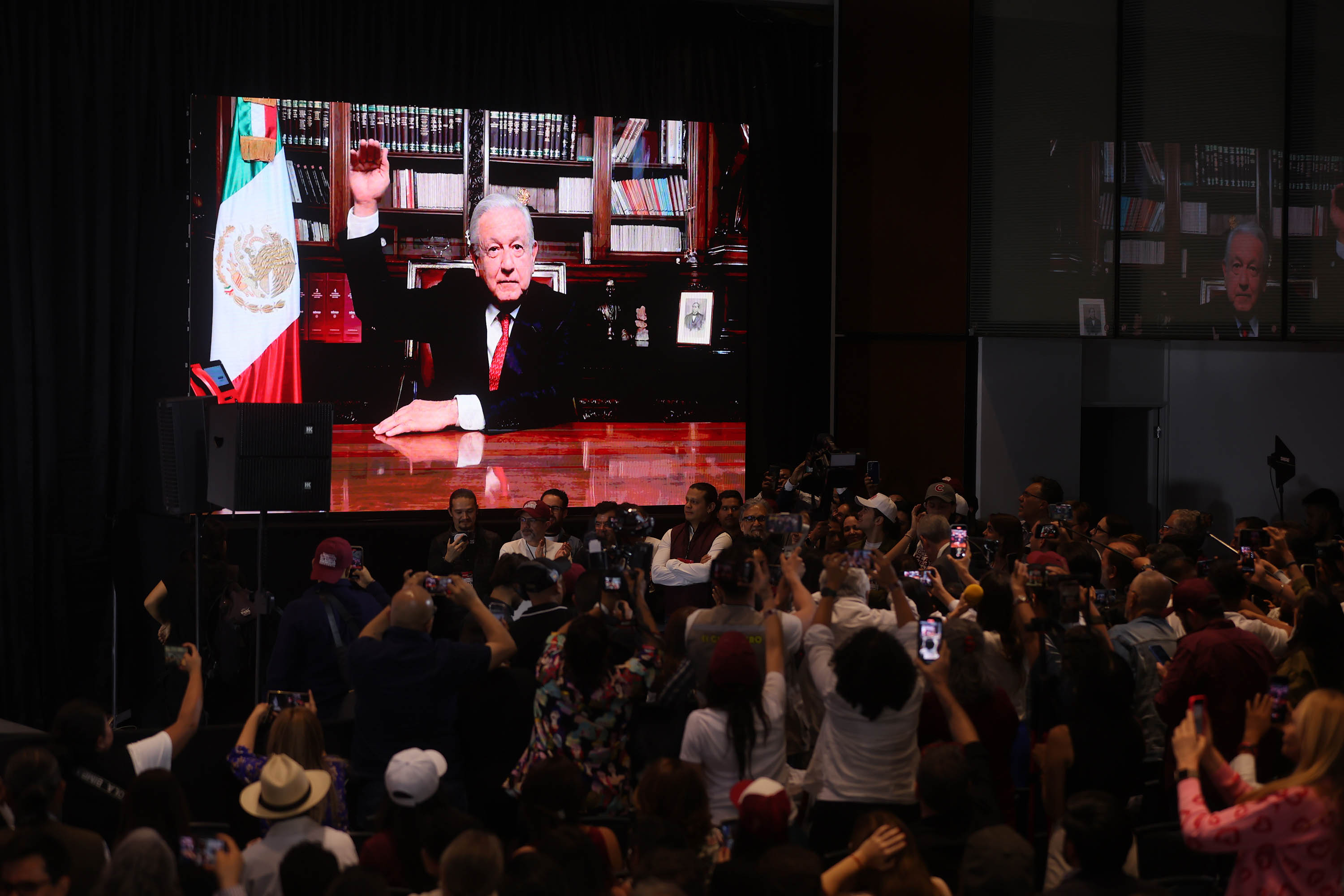
Mexico's President Andres Manuel López Obrador has congratulated Claudia Sheinbaum on her expected win in Sunday's presidential election.
"With all my affection and respect I congratulate Claudia Sheinbaum who came out victorious with an ample margin. She will be the first (female) President of Mexico... but also the President, possibly, with most votes obtained in all of the history of our country," he said in a video posted on X.
López Obrador also congratulated the other presidential candidates and the Mexican people, saying he was proud of the large turnout.
Mexico's expected president Sheinbaum pledges to govern all Mexicans "without distinction"
From CNN's Michael Rios
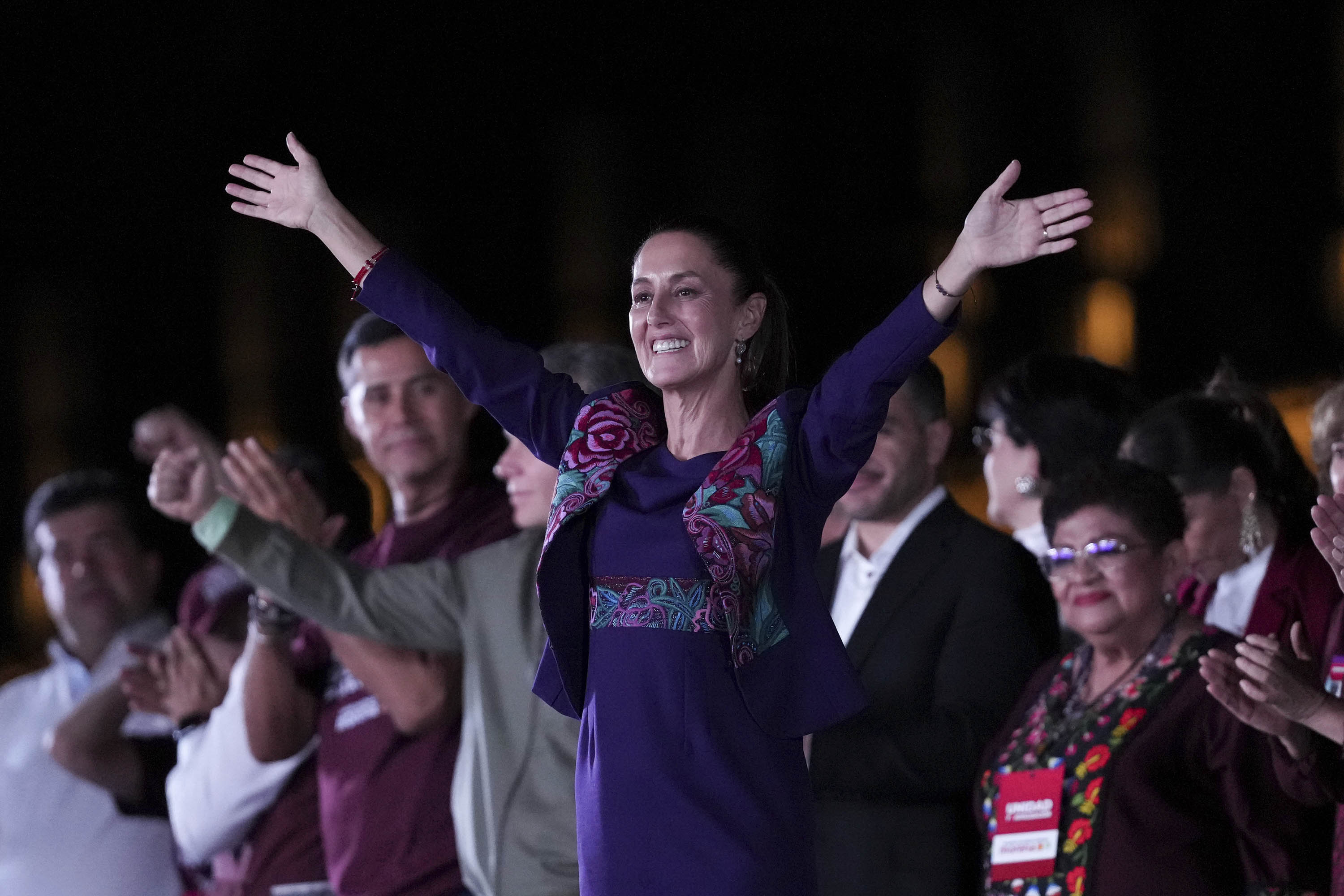
Claudia Sheinbaum has responded to the announcement of her projected victory in Mexico's presidential election early Monday morning, saying her administration would govern all Mexicans “without distinction,” even though not everyone supports her policies.
“Our duty is and will always be to look after every single Mexican without distinction. So even though many Mexicans do not fully agree with our project, we will have to walk in peace and harmony to continue building a fair and more prosperous Mexico,” she told supporters in a speech.
She also spoke about the historical significance of becoming the first female president of the country.
Sheinbaum said her two rivals in the race, Xóchitl Gálvez and Jorge Álvarez Máynez, had called to congratulate her on her projected victory.
Sheinbaum, the candidate from the ruling party, received the most votes in Sunday's elections, according to preliminary results from the National Electoral Institute.
The Electoral Court must validate the presidential election, and if confirmed, Sheinbaum will start her presidency on October 1.
Sheinbaum's large margin shows power of Mexico's ruling party, CNN journalist says
From CNN's Kathleen Magramo
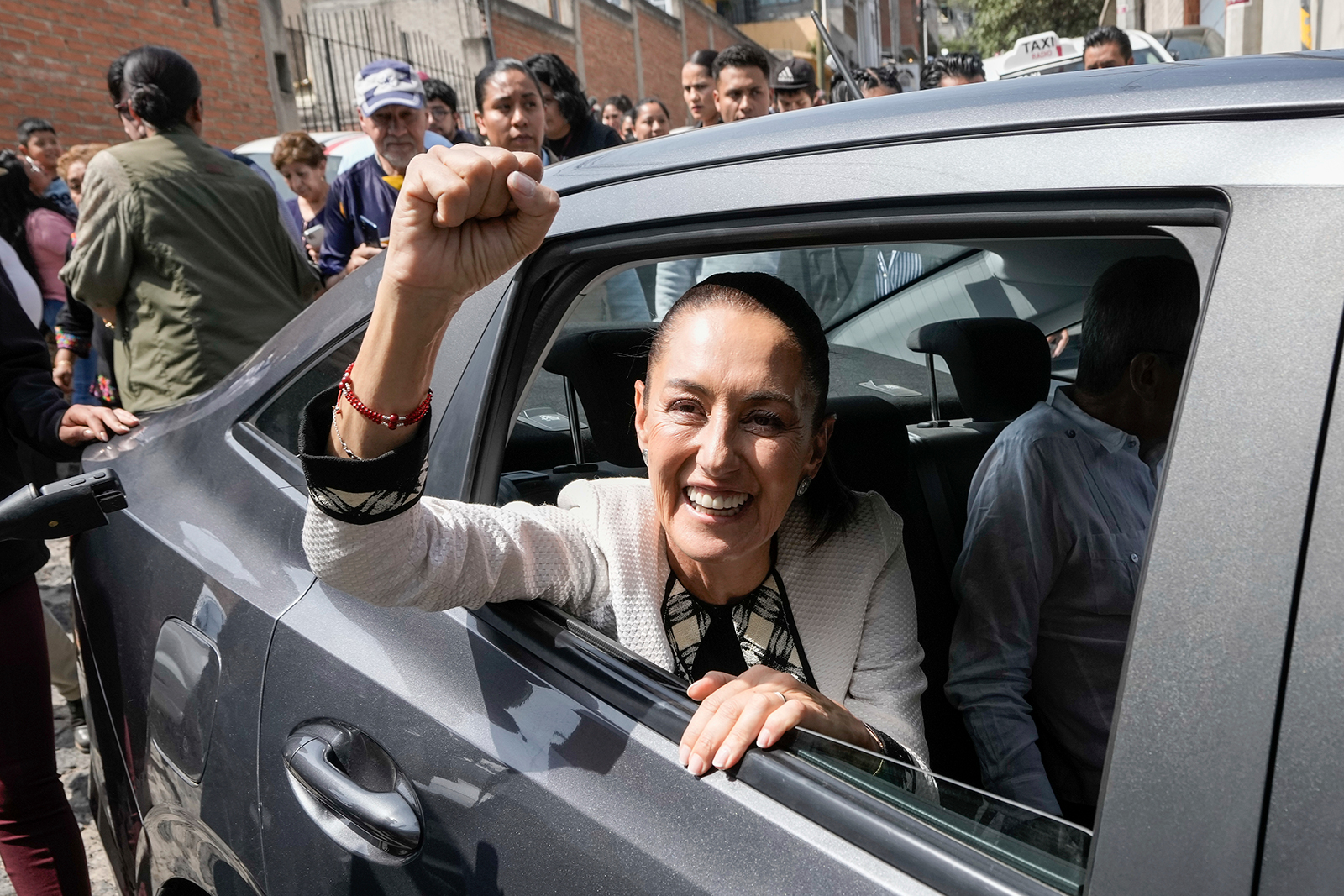
Even though Claudia Sheinbaum was expected to win during campaign polls, her large margin in the votes came as a shock, CNN’s Gustavo Valdes reports from Mexico City.
Sheinbaum might get up to 60% of the vote, which is even higher than outgoing President Andrés Manuel López Obrador when he was elected six years ago, Valdes said.
Sheinbaum is the candidate for the ruling Morena party.
"That gives you an idea of the political power that López Obrador has amassed over the past six years," Valdes told CNN's Rosemary Church.
Valdes said voters told CNN that a woman president would help change Mexico's image of being a "macho" country, where patriarchal culture impedes women's advancements.
"Mexico has actually changed its laws to encourage and actually force the parties to have more female candidates. So so there's a very equal division of power between many woman in congress and the governorships," Valdes said.
Please enable JavaScript for a better experience.
- My View My View
- Following Following
- Saved Saved
Mexican president says Venezuela, Cuba accept deported migrants from Mexico
- Medium Text
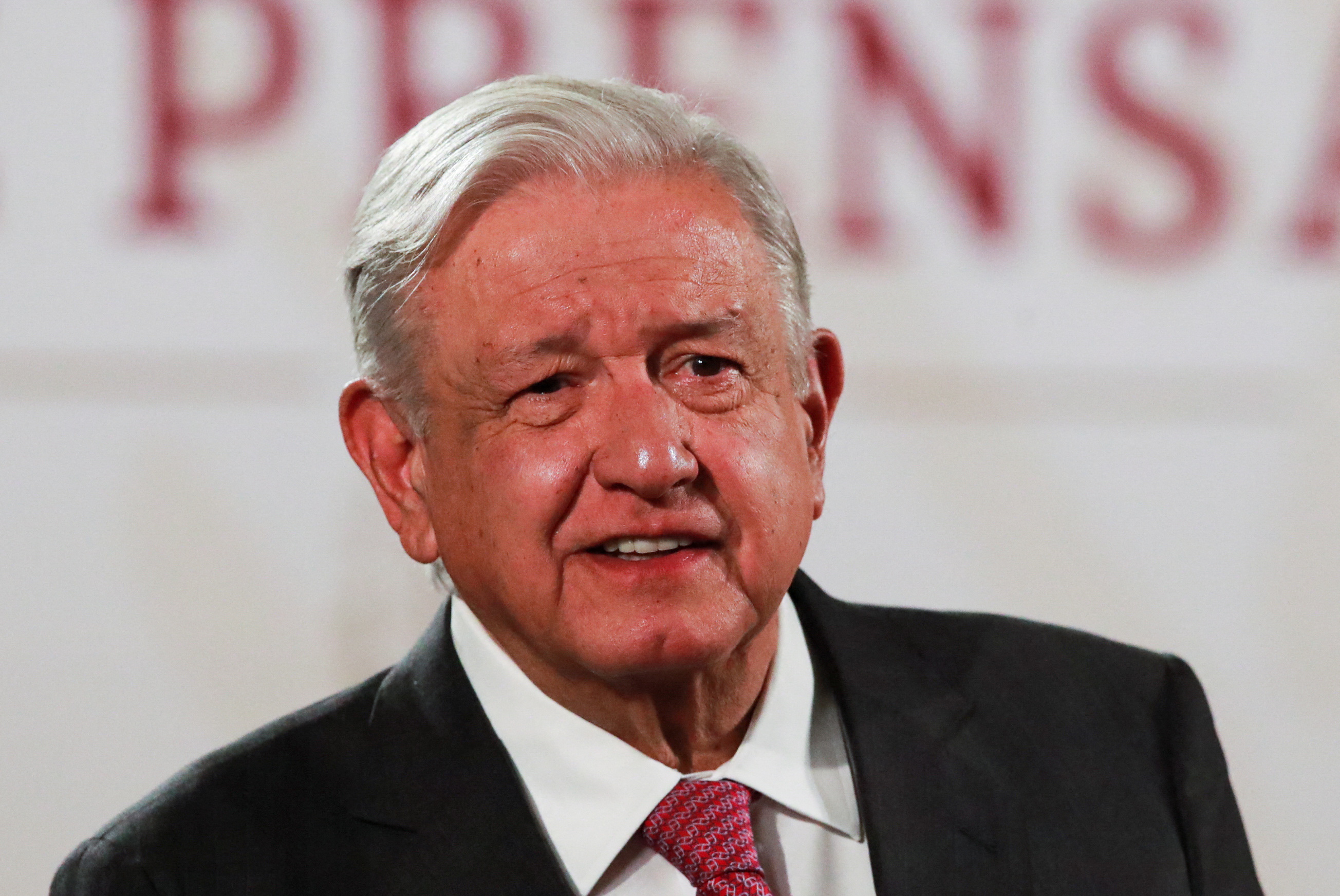
Sign up here.
Reporting by Ana Isabel Martinez and David Alire Garcia; Editing by Valentine Hilaire
Our Standards: The Thomson Reuters Trust Principles. New Tab , opens new tab
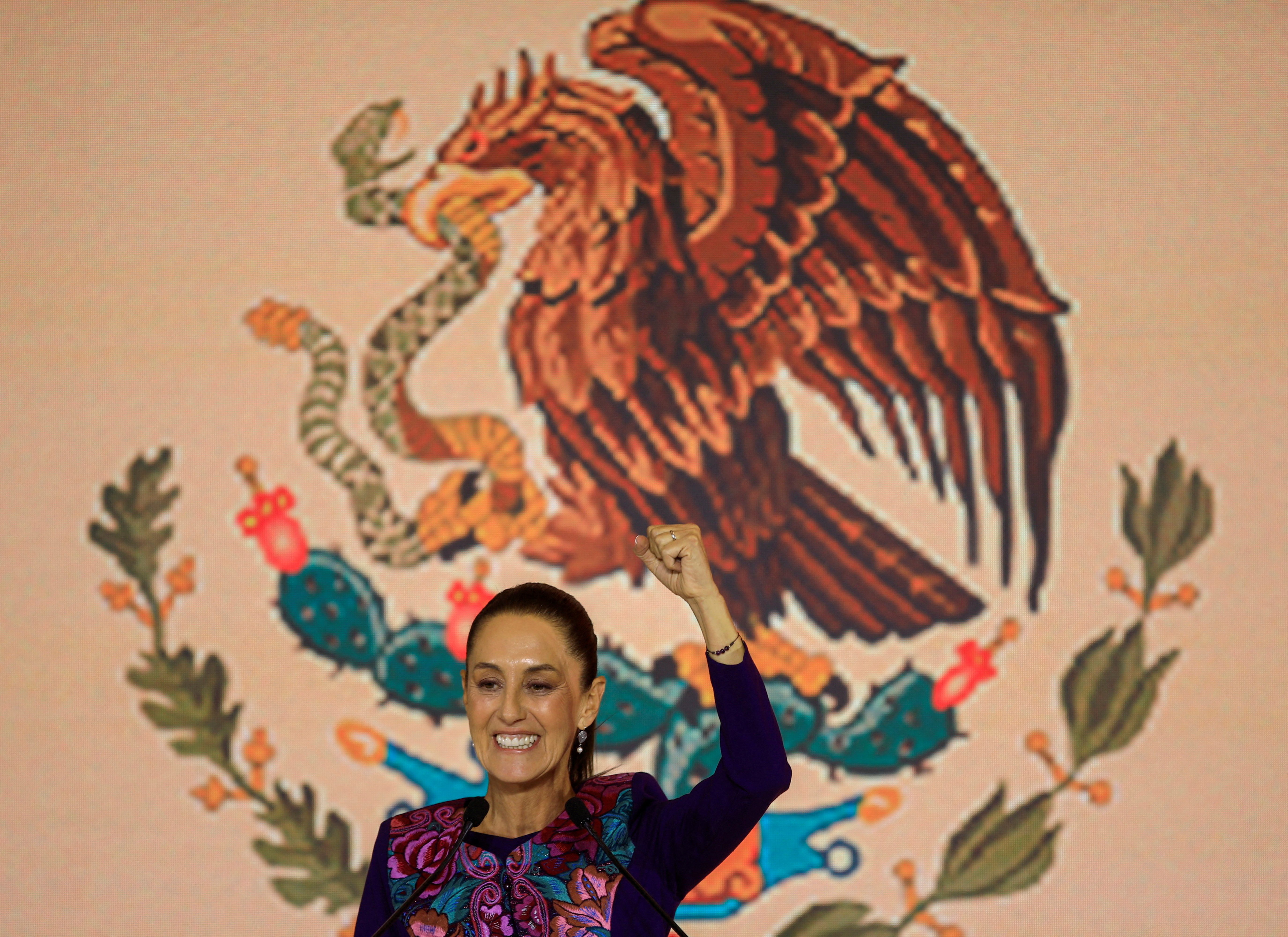
World Chevron

South Africa's ANC will seek to form government of national unity
South Africa's African National Congress will invite other political parties to form a national unity government, its leader President Cyril Ramaphosa said on Thursday, after it lost its majority for the first time in the democratic era.
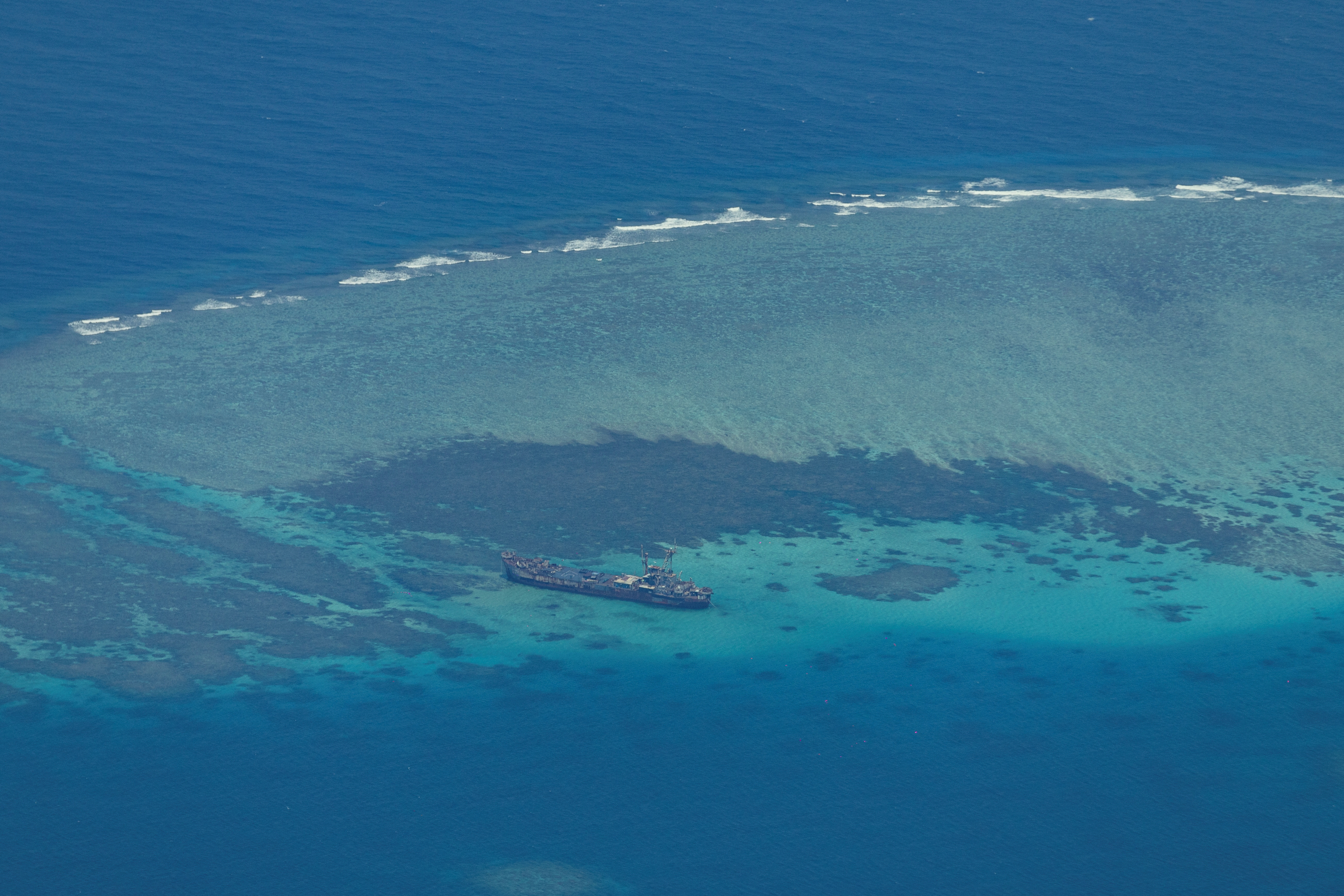

IMAGES
VIDEO
COMMENTS
Mexico on Thursday formally announced new visa requirements for visitors from Venezuela in the government's official gazette, as part of efforts to curb a sharp increase in unlawful immigration at ...
4 of 8 | . FILE - A migrant holds up his Venezuelan passport outside the Border Transit Comprehensive Care Center, guarded by National Guards, to ask for legal documents that allow his group to travel through Mexico, on the outskirts of Huixtla, Chiapas state, Mexico, June 10, 2022, after the group left Tapachula by foot five days prior, tired of waiting to normalize their status in a region ...
Venezuelan citizens must obtain a visa before entry into Mexico. Reach Mexico embassy or consulate for the instructions how to apply the visa. Updated: 06/04/2024. Entry requirements. visa required.
Mexico deported only about 429 Venezuelans during the first two months of 2024, meaning nearly all are waiting in Mexico. Many fear that venturing north of Mexico City will get them fleeced or returned to southern Mexico. The U.S. admits 1,450 people a day through CBP One with appointments that are granted two weeks out.
January 12, 2022. On January 6, 2022, the Mexican Ministry of the Interior published in the Official Gazette of the Federation an agreement announcing a change in Mexican migration policy, requiring Venezuelan citizens to obtain a visa to enter national territory. This change will take effect on January 21, 2022, and will require all Venezuelan ...
Mexico will require visas for Venezuelans after the U.S. reportedly requested tighter entry requirements due to the number of Venezuelan migrants coming into the country. Mexico's Interior ...
Associated Press. Aug. 26, 2022 2:50 PM PT. MEXICO CITY —. When Mexico imposed a visa requirement on Venezuelans in January, it briefly had the desired effect: The number of Venezuelans detained ...
May 13, 2024. Venezuela - Level 4: Do Not Travel. O D K H U T C. Reissued after routine periodic review with minor edits pursuant to Department of State standard processes. Do not travel to Venezuela due to crime, civil unrest, kidnapping , and the arbitrary enforcement of local laws . Reconsider travel due to wrongful detentions , terrorism ...
Mexico is considering setting tougher entry requirements for Venezuelans, partly in response to U.S. requests, after a sharp rise in border arrests of Venezuelans fleeing their homeland, according ...
Mexico on Thursday formally announced new visa requirements for visitors from Venezuela in the government's official gazette, as part of efforts to curb a sharp increase in unlawful immigration at ...
Venezuelans who seek to enter the U.S. illegally will be returned to Mexico; New lawful pathway created for some Venezuelans. WASHINGTON - Today, as part of the Biden-Harris Administration's ongoing work to build a fair, orderly, and secure immigration system, the Department of Homeland Security (DHS) is announcing joint actions with Mexico to reduce the number of people arriving at our ...
MEXICO CITY, Dec 17 (Reuters) - Mexico will impose visa requirements on Venezuelan visitors, the interior ministry said on Friday, as the country attempts to stem a steep rise in the number of ...
After Mexico, Costa Rica, and Belize imposed new visa requirements for Venezuelans, making it more difficult for them to travel north by plane, the number crossing the dangerous Darien Gap on the ...
Location: Mexico Event: The U.S. Department of State updated the Mexico Travel Advisory and the Mexico country information page on August 22, 2023. The Travel Advisory includes individual risk assessment levels for each state. Actions to Take: Read the Mexico Travel Advisory, including the detailed state summaries and advisory levels for information on your specific travel destination.
Reissued after periodic review with general security updates, and the removal of obsolete COVID-19 page links. Country Summary: Violent crime - such as homicide, kidnapping, carjacking, and robbery - is widespread and common in Mexico.The U.S. government has limited ability to provide emergency services to U.S. citizens in many areas of Mexico, as travel by U.S. government employees to ...
Call us in Washington, D.C. at 1-888-407-4747 (toll-free in the United States and Canada) or 1-202-501-4444 (from all other countries) from 8:00 a.m. to 8:00 p.m., Eastern Standard Time, Monday through Friday (except U.S. federal holidays). See the State Department's travel website for the Worldwide Caution and Travel Advisories.
As Venezuela's economic, humanitarian and political crisis has dragged on, the number of people fleeing Venezuela has continued to rise. Over 6 million Venezuelans, or approximately 20 percent of Venezuela's population, have fled the country, making it the largest international displacement in the hemisphere's history. As the COVID-19 pandemic has prompted restrictive border policies and
Americas. Mexico. Panama. Venezuela. New visa restrictions by several countries in the Americas have led to a significant increase in the number of Venezuelans crossing a dangerous jungle area on ...
Individuals and families who do not have a legal basis to remain in the United States will be removed — just as we have done with the resumption of removal flights to Venezuela." Noncitizens, including Venezuelan nationals, who lack a lawful basis to stay in the United States will be removed, consistent with U.S. law.
More than 7.7 million people have fled Venezuela in recent years to escape its precipitous economic ... 2022 to 3,000 in February 2022 after Mexico ended visa-free travel for Venezuelans at the ...
Mexico's government has restarted repatriation flights of Venezuelans, it said on Saturday, two days after officials agreed to work more closely with their U.S. counterparts to tackle record ...
For a chance at a better life, Venezuelans head toward the U.S. border Large numbers of migrants from Venezuela are traveling thousands of miles to the U.S.-Mexico border, as their nation ...
Mexico currently accepts U.S. deportations of up to 30,000 citizens of Cuba, Haiti, Nicaragua, and Venezuela every month under a May 2023 Biden administration rule, currently facing judicial challenges, that denies asylum to migrants who cross the border between ports of entry without having sought it elsewhere along their migration route.
Venezuelans who seek to enter the U.S. illegally will be returned to Mexico; New lawful pathway created for some Venezuelans . WASHINGTON - Today, as part of the Biden-Harris Administration's ongoing work to build a fair, orderly, and secure immigration system, the Department of Homeland Security (DHS) is announcing joint actions with Mexico to reduce the number of people arriving at our ...
Biden sets asylum limits as large numbers of migrants arrive at U.S.-Mexico border. Migrants between the primary and secondary fencing at the Tijuana-San Diego border on May 11, 2023, are waiting ...
Countries including Venezuela and Cuba accept migrants deported by U.S. officials from Mexico, the Mexican president said on Thursday, but he added that he would prefer that Washington enter into ...
"Just the thought of coming back to Mexico," Marco Morales, 46, a teacher from Venezuela traveling with the group, said. He paused for a moment. "It makes we want to cry."
The U.S. Department of State has reissued a travel warning for a popular South American spot with a Level 4: Do Not Travel Advisory to all Americans. The Department of State is urging Americans to ...
Claudia Sheinbaum: The 61-year-old Sheinbaum is a former Mexico City mayor and climate scientist. A longtime political ally of incumbent President Andrés Manuel López Obrador, she was the Mexico ...
MEXICO CITY, June 6 (Reuters) - Countries including Venezuela and Cuba accept migrants deported by U.S. officials from Mexico, the Mexican president said on Thursday, but he added that he would ...